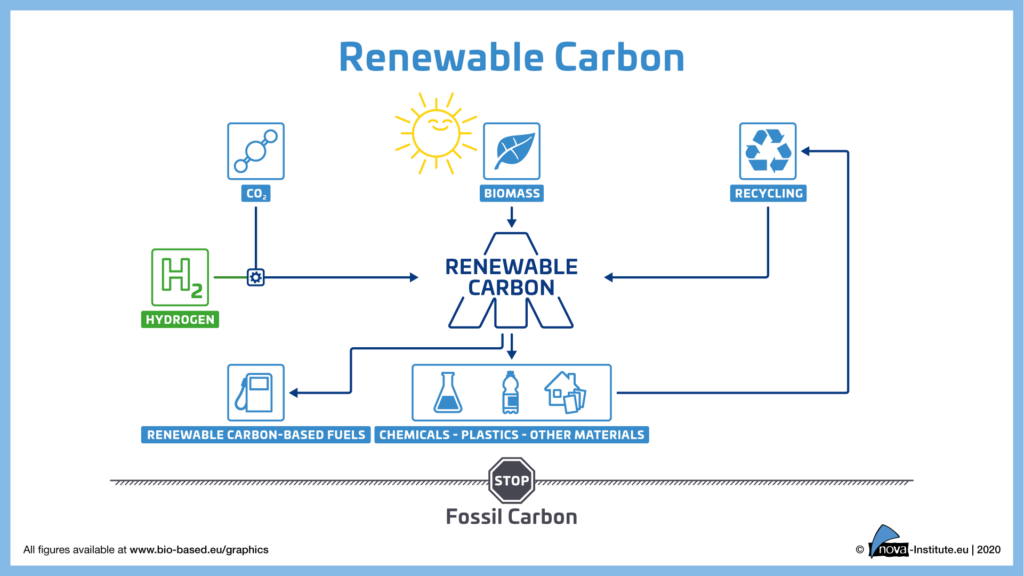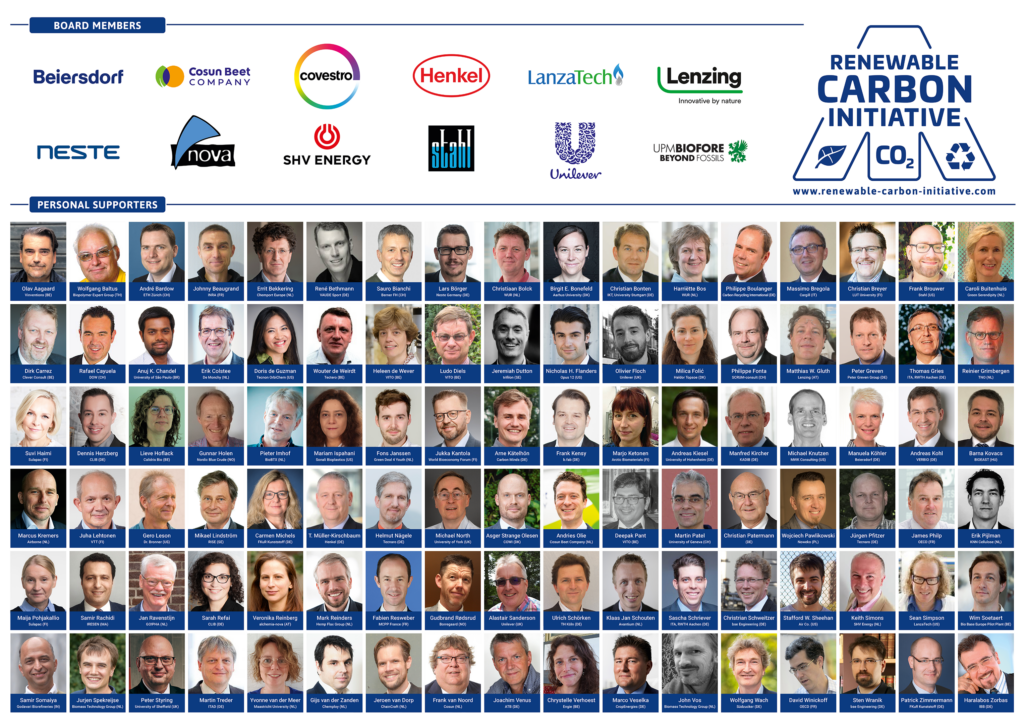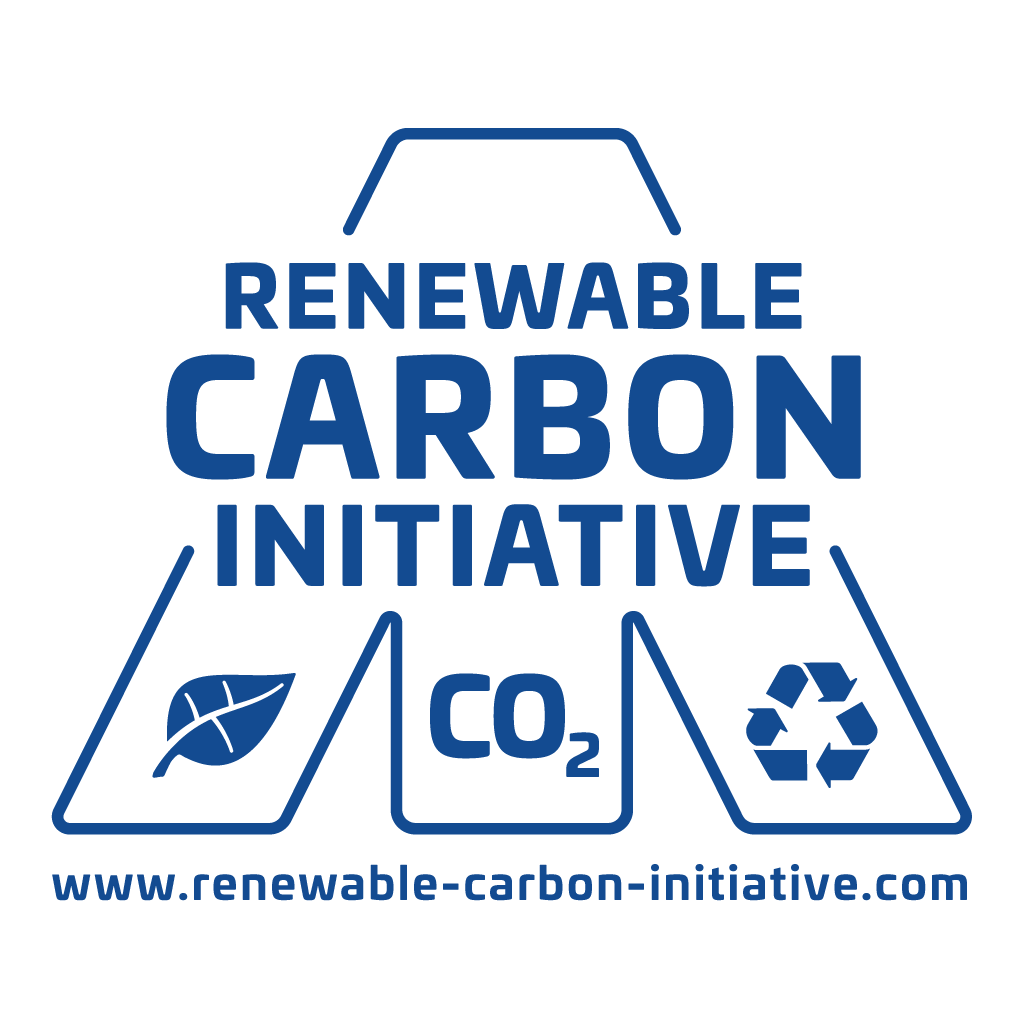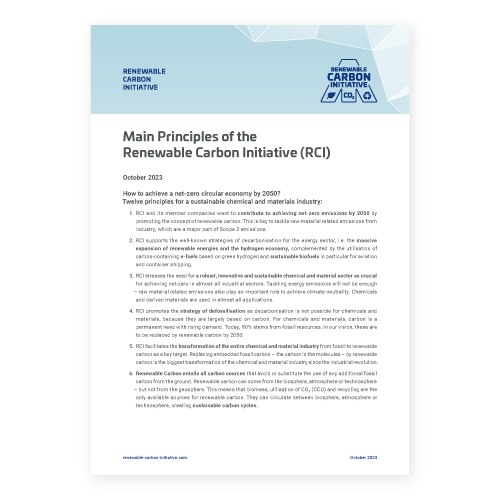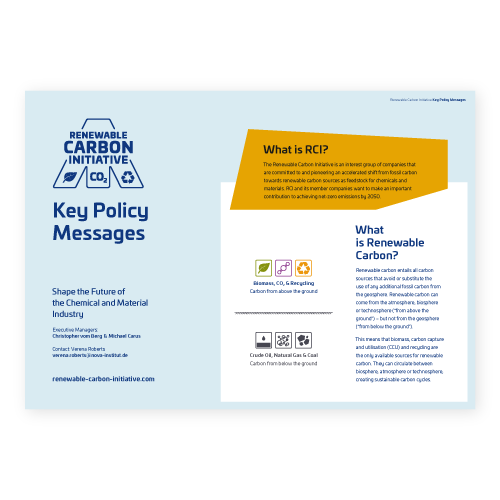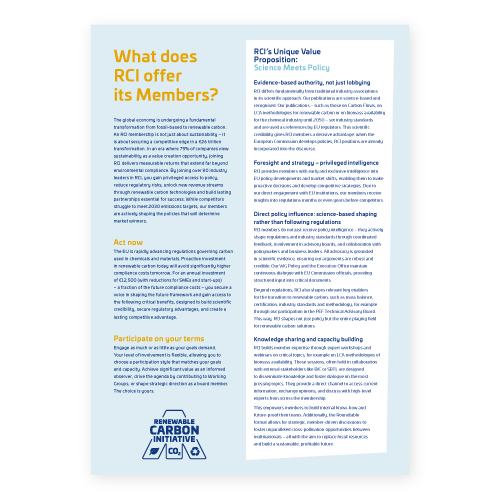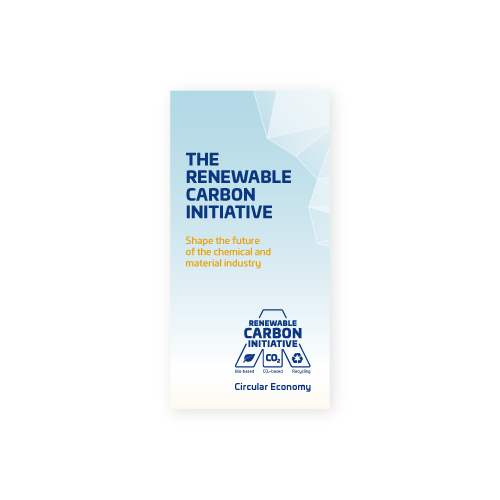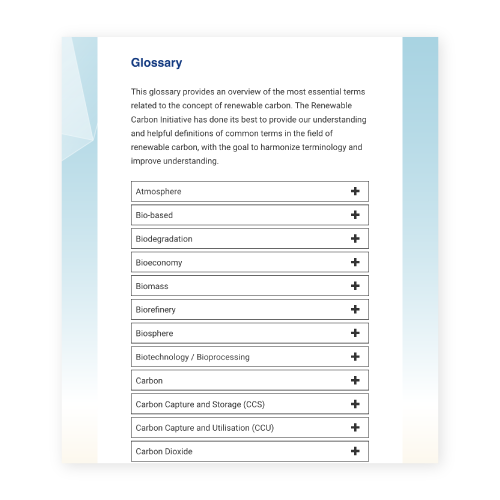Publications
Key Documents of the RCI
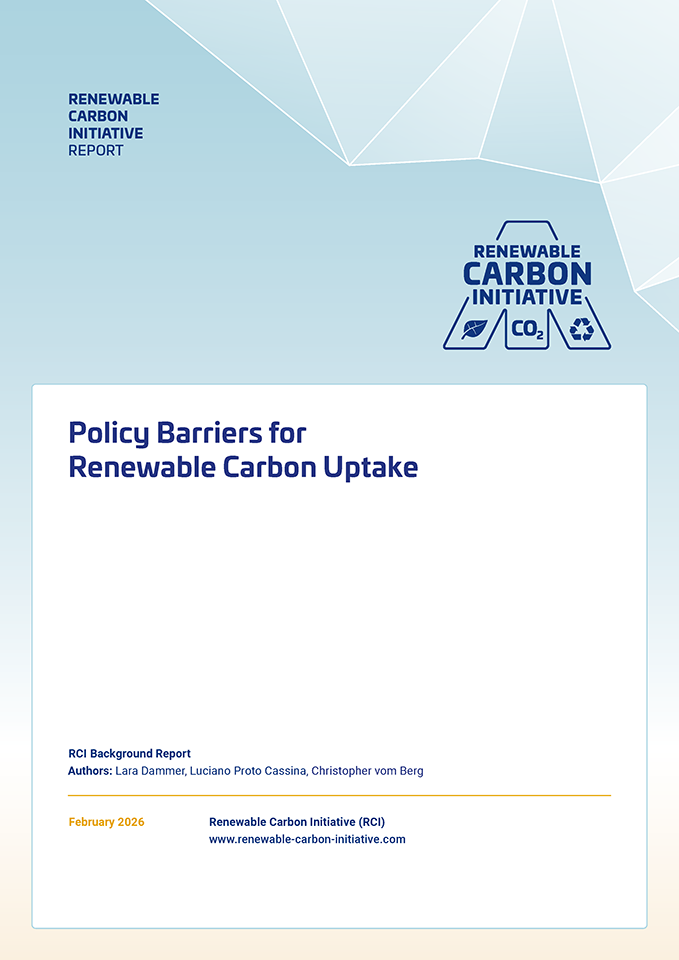
Policy Barriers for Renewable Carbon Uptake
February 2026
Based on internal assessment of RCI member companies and joint analysis, this report reveals existing EU legislation which creates several roadblocks for the shift from fossil to renewable carbon, The report identifies ten concrete policy barriers across seven EU frameworks, including the ETS, REDIII, PPWR and SUPD. Key findings show regulatory misalignment (creating non-level playing fields and regulatory uncertainty), outdated definitions and misleading classifications (excluding innovative, climate-friendly products from incentives and market access) and impractical administrative bureaucracy (often conflicting with industrial realities). The biggest barrier is not identified in a single regulation, but identified as the lack of coherent support for renewable carbon in the chemicals and derived materials economy. The report provides practical suggestions to amend and fine-tune regulations in upcoming legislative revisions. It complements RCI’s Policy Proposal Study published in 2025.
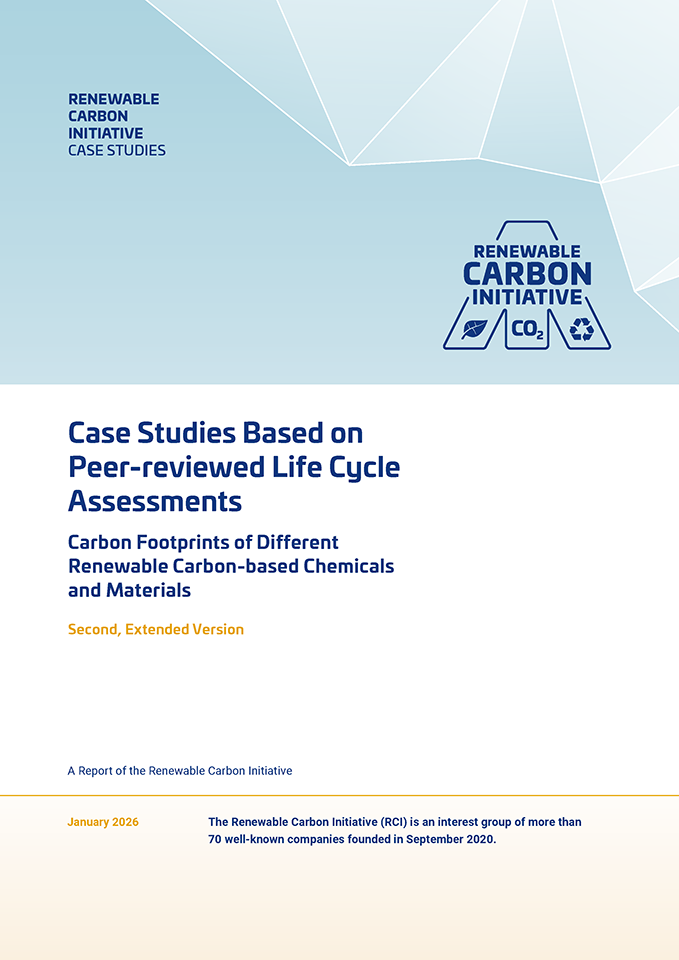
Case Studies Based on Peer-reviewed Life Cycle Assessments: Carbon Footprints of Different Renewable Carbon-Based Chemicals and Materials (2nd, Extended Version)
January 2026
This report broadens the scope of the brochure “Case studies based on peer-reviewed Life Cycle Assessments – Carbon Footprints of Different Carbon-Based Chemicals and Materials”, published in November 2023. The initial brochure presented five peer-reviewed studies that drew strong interest from experts, policymakers, and industry leaders for their insights into the carbon footprints of various carbon-based chemicals and materials. This second, extended version includes seven peer-reviewed LCAs from participating member companies: Braskem, Econic, Fibenol, LanzaTech, Lenzing (update), Peter Greven and Primient Covation (https://doi.org/10.52548/HRPM7087).
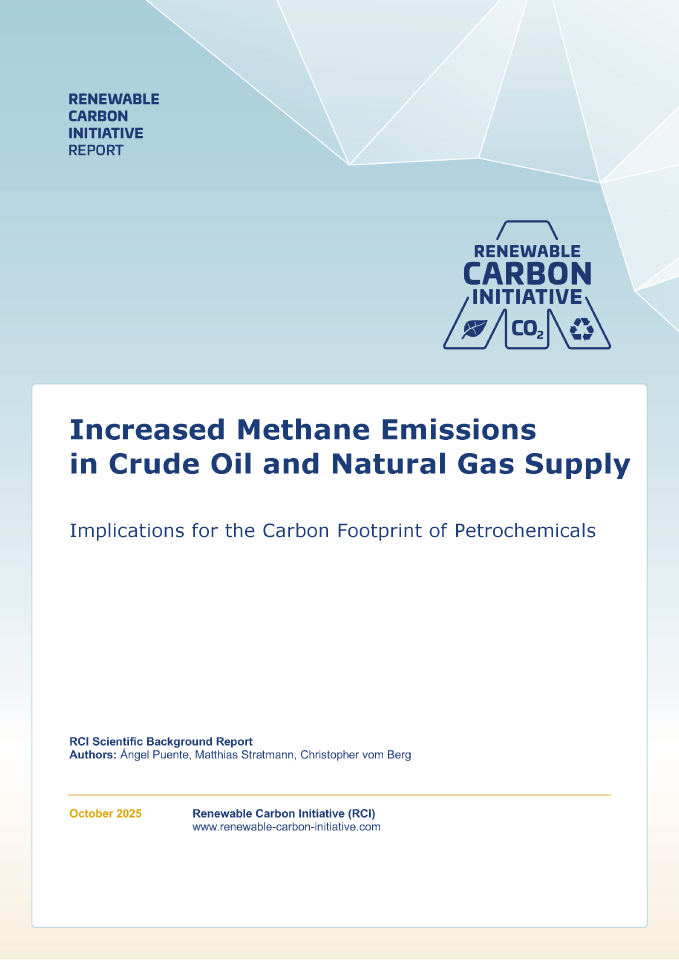
Increased Methane Emissions in Crude Oil and Natural Gas Supply: Implications for the Carbon Footprint of Petrochemicals
October 2025
This scientific background report by RCI shows that recent updates to leading LCI databases (ecoinvent 3.9–3.11) reveal a major underestimation of methane emissions from oil and gas supply chains. Enhanced satellite data on flaring, venting, and leaks highlight large inconsistencies compared to sources such as IEA, IOGP, and the World Bank. For instance, IEA now reports oil-related methane emissions up to 15 times higher than IOGP, with extreme differences for Russia (10-fold) and Saudi Arabia (40-fold). These revisions sharply increase the carbon footprint of fossil feedstocks, with naphtha nearly tenfold higher and significant rises for ethylene, propylene, and ethylene glycol. As a consequence, plastics such as PE, PP, and PET show 20–30% higher footprints. By contrast, renewable carbon alternatives gain ground: bio-based plastics now appear 12–27% more climate-friendly, with even greater advantages when biogenic carbon uptake is included (https://doi.org/10.52548/RQJN5517).
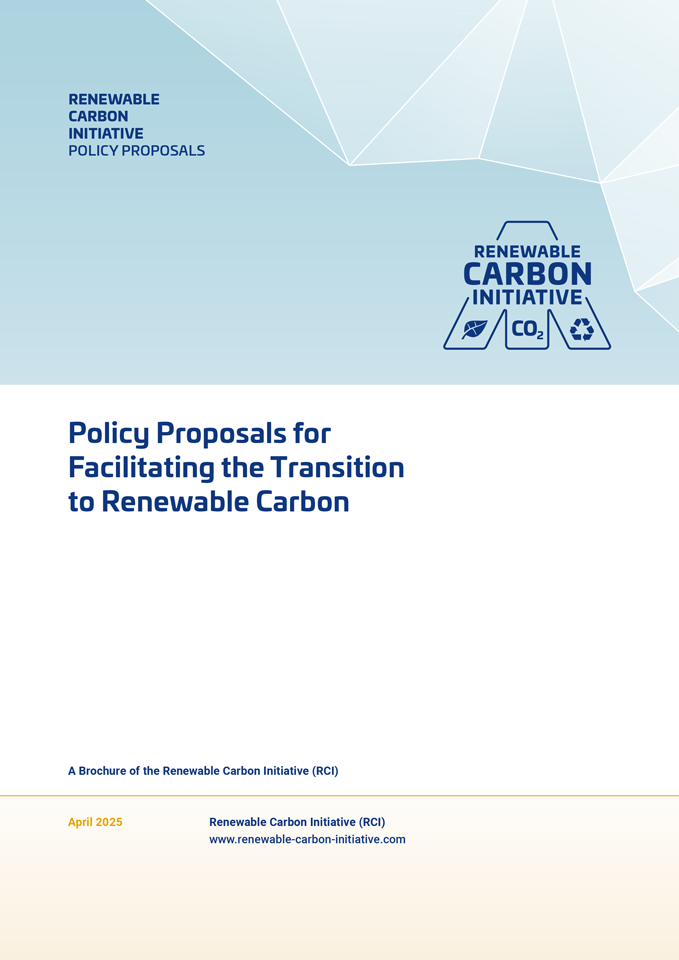
RCI Policy Proposals for Facilitating the Transition to Renewable Carbon
April 2025
The report outlines a strategic roadmap for transforming Europe’s chemical industry by transitioning from fossil-based to renewable carbon sources. It highlights the industry’s current crisis which is driven by global competition, high energy costs, and regulatory pressure, and stresses the urgency of reducing dependence on fossil feedstocks. The report proposes ten comprehensive policy measures including mandatory renewable carbon targets, adaptation of emissions trading systems, and financial support mechanisms. These proposals aim to create market demand, drive innovation and build industrial resilience. Key enablers include harmonised standards, robust certification, infrastructure development, and stakeholder engagement ( https://doi.org/10.52548/DZRU4577).
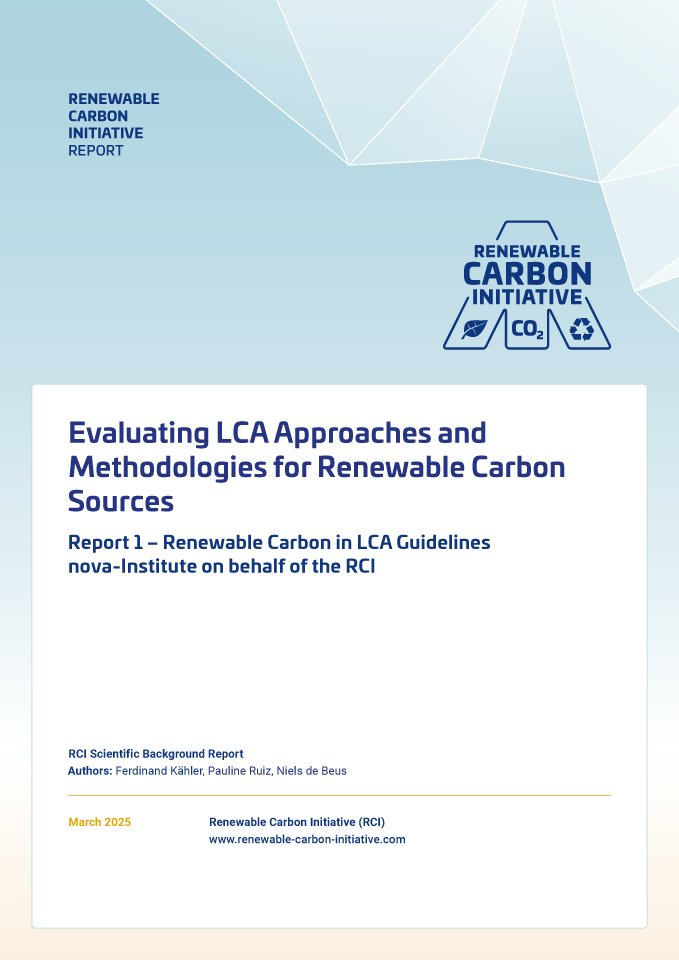
Evaluating LCA Approaches and Methodologies for Renewable Carbon Sources
Report 1 of 3 – Renewable Carbon in LCA Guidelines
March 2025
Renewable Carbon in LCA Guidelines (146 pages) evaluates methodological choices which impact LCAs for products containing renewable carbon in existing LCA frameworks and guidelines. The study specifically examines the similarities and differences in the methodological choices of guidelines, as well as the implications of these methodological aspects on the resulting LCA outcomes (https://doi.org/10.52548/VCYM7822).
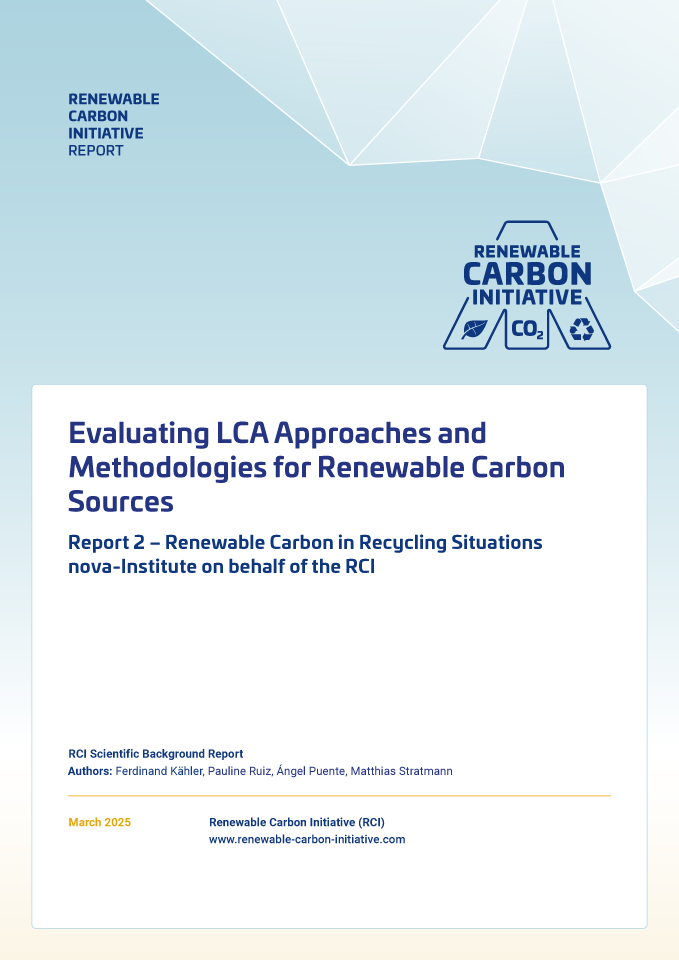
Evaluating LCA Approaches and Methodologies for Renewable Carbon Sources
Report 2 of 3 – Renewable Carbon in Recycling Situations
March 2025
This report (36 pages) focuses on renewable carbon in recycling scenarios and the key challenges in LCA and carbon footprint assessments. It examines system boundaries, allocation methods, and biogenic carbon accounting approaches, highlighting their influence on sustainability evaluations. The report emphasises the cut-off and avoided-burden approaches for recycling while recommending the -1/+1 method for biogenic carbon transparency. However, it also identifies contradictions between LCA results and broader sustainability goals, such as the EU waste hierarchy, which prioritises recycling. To address these inconsistencies, the report suggests integrating LCA with additional sustainability metrics like land use and recyclability (https://doi.org/10.52548/QTVU8642).
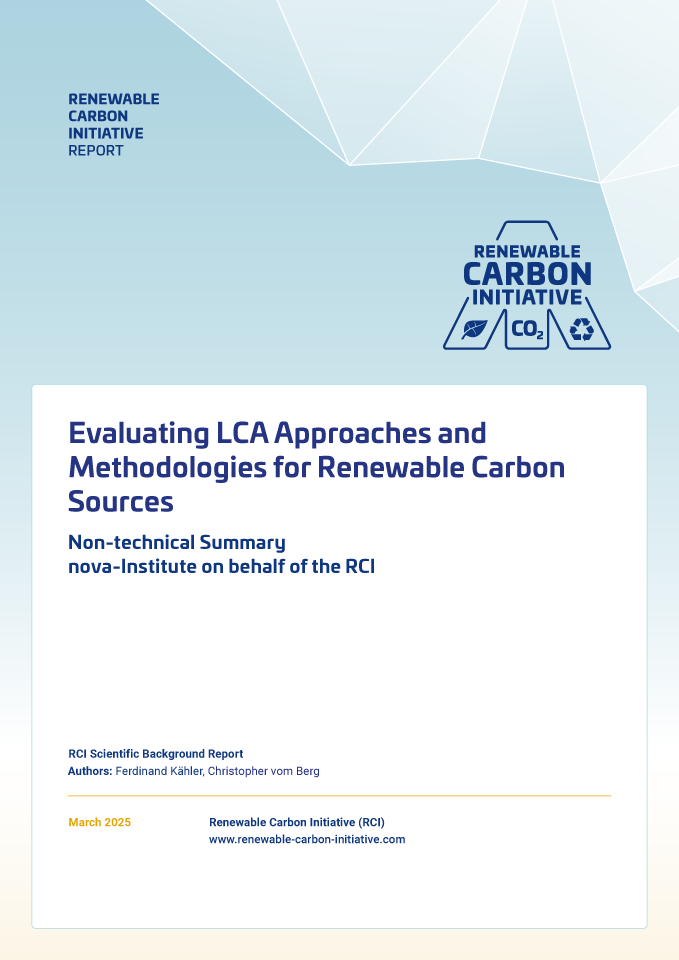
Evaluating LCA Approaches and Methodologies for Renewable Carbon Sources
Report 3 of 3 – Non-technical Summary
March 2025
This Non-technical Summary (15 pages) highlights main insights into the project results and states key take-aways for policy-makers. It compares several frameworks, such as ISO 14040, Product Environmental Footprint (PEF), and GHG Protocol, finding both commonalities and critical differences in areas like biogenic carbon accounting and recycling assessment. The study identifies significant methodological flexibility in existing frameworks, leading to inconsistencies in LCA results and challenges in standardisation (https://doi.org/10.52548/ZEKY1803).
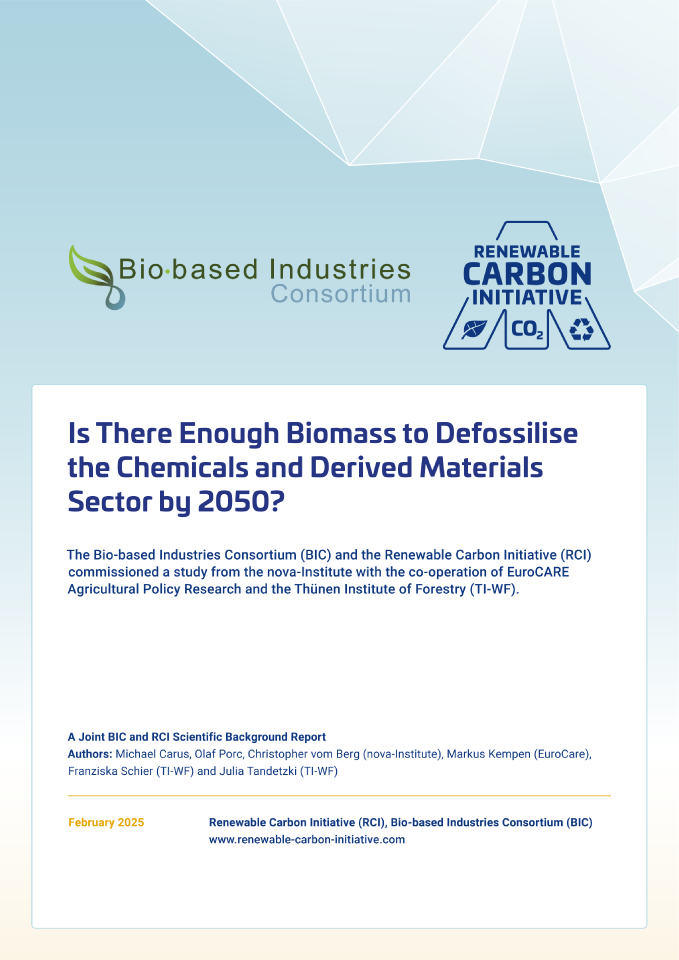
Is there Enough Biomass to Defossilise the Chemicals and Derived Materials Sector by 2050? – A Joint BIC and RCI Scientific Background Report
February 2025
This reports presents the findings of a joint project of the Bio-based Industries Consortium (BIC) and the Renewable Carbon Initiative (RCI), which focuses on whether agricultural and woody biomass combined sustainably provide enough biomass to meet 20% of the future carbon demand of the chemical and derived materials industries in 2050 (up from 5.5% (EU27) and 10% (global) in 2023) (https://doi.org/10.52548/PIRL6916).
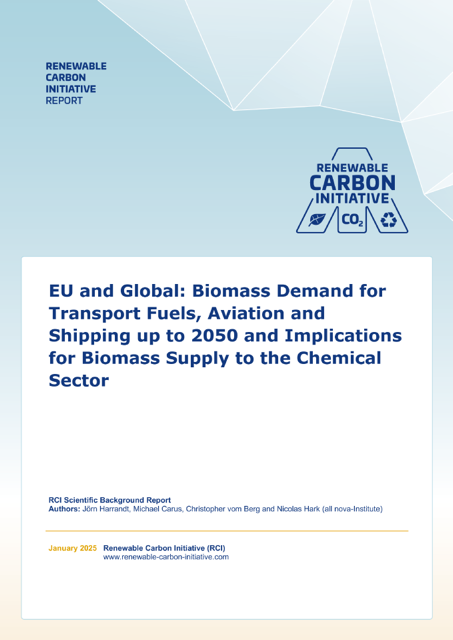
EU and Global: Biomass Demand for Transport Fuels, Aviation and Shipping up to 2050 and Implications for Biomass Supply to the Chemical Sector
January 2025
This report explores three potential future scenarios for carbon-based fuel demand up to 2050 under current policy frameworks. It predicts a sharp rise in the demand for second-generation biomass biofuels, driven primarily by increasing quotas for aviation and shipping fuels. This growth raises concerns about ecological and resource sustainability and creates challenges for sectors like chemicals and materials, which rely on renewable carbon to reduce fossil dependency. Without similar regulatory incentives, these sectors may face limited access to critical feedstocks like biomass and captured carbon (https://doi.org/10.52548/GXVG4189).
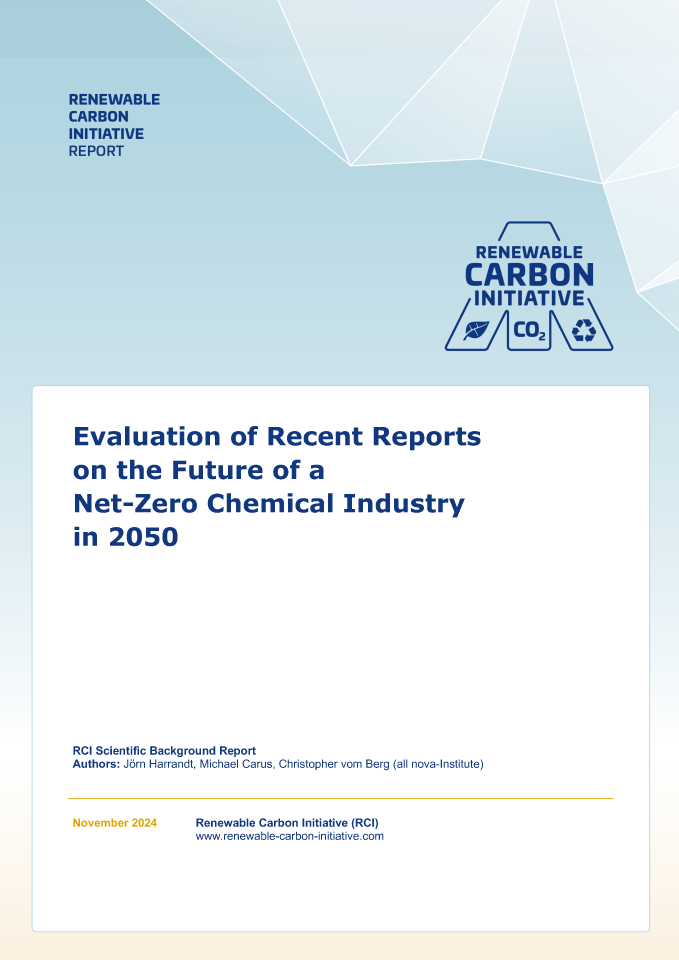
Evaluation of Recent Reports on the Future of a Net-Zero Chemical Industry in 2050
November 2024
This report assesses 24 scenarios from 15 studies to envision a net-zero chemical industry by 2050. The analysis anticipates continued growth in chemical production, projecting a 2.4-fold increase in global feedstock demand by 2050 compared to 2020 levels, with most expansion expected outside Europe while European feedstock volumes remain stable (https://doi.org/10.52548/SXWV6083).
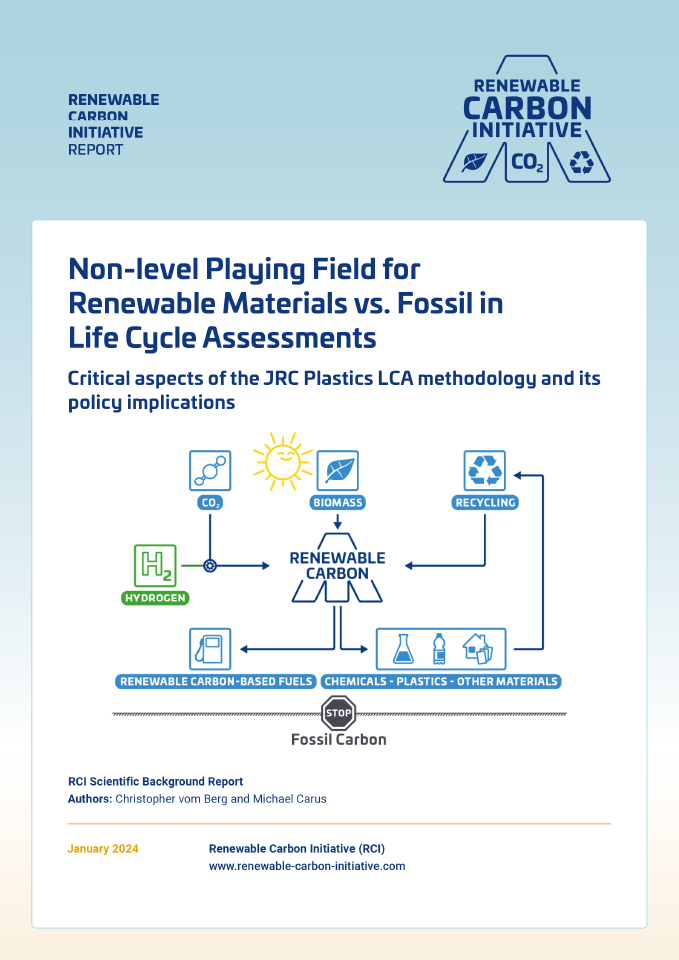
Non-level playing field for renewable materials vs. fossil in Life Cycle Assessments – Critical aspects of the JRC Plastics LCA methodology and its policy implications
January 2024
This report was mainly motivated by a study published by JRC in 2021 with the title: “LCA of alternative feedstocks for plastic products”, commonly referred to as the JRC Plastics LCA Method (Nessi et al. 2021). It is mainly aiming to provide additional context to highlight issues that might arise with implementation of the JRC Plastics LCA methodology, and dives deeper into five aspects (https://doi.org/10.52548/KOTY2900).
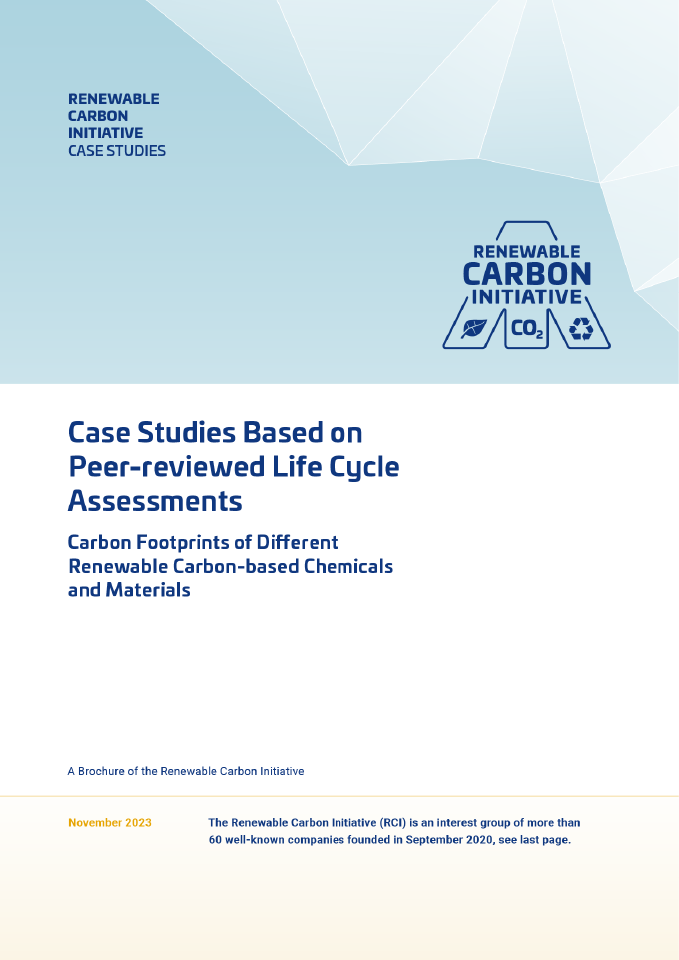
Case Studies Based on Peer-reviewed Life Cycle Assessments – Carbon Footprints of Different Carbon-based Chemicals and Materials
November 2023
This brochure presents five already existing peer-reviewed LCA case studies – representing the highest possible scientific standard – that examine the carbon footprint of materials and products made from renewable carbon. These case studies are on products from RCI member companies Avantium (NL), BASF (DE), IFF (US), Lenzing (AT), Neste (FI) and all LCAs have been peer-reviewed by external experts. The LCAs have been summarised by experts of nova-Institutes sustainability team (https://doi.org/10.52548/YYZY2819).
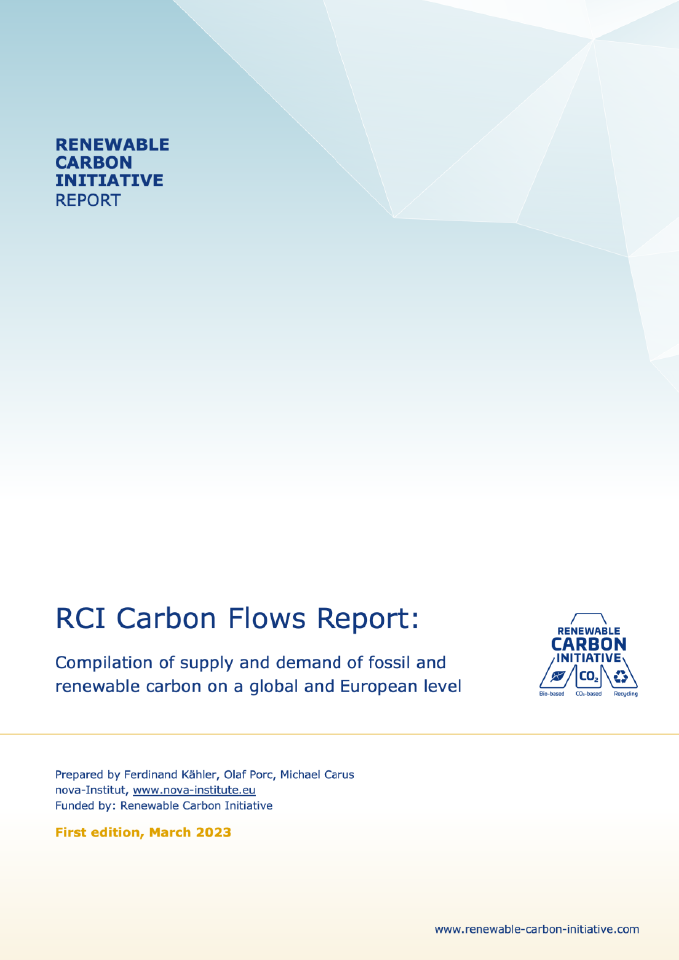
RCI Carbon Flows Report – Compilation of Supply and Demand of fossil and renewable carbon on a global and European level
October 2023
The Carbon Flows report is a compilation of supply and demand of fossil and renewable carbon on a global and European level. It provides a comprehensive understanding of today’s carbon flows and what it means to replace fossil carbon with renewable carbon in the materials and chemicals sectors (https://doi.org/10.52548/KCTT1279).
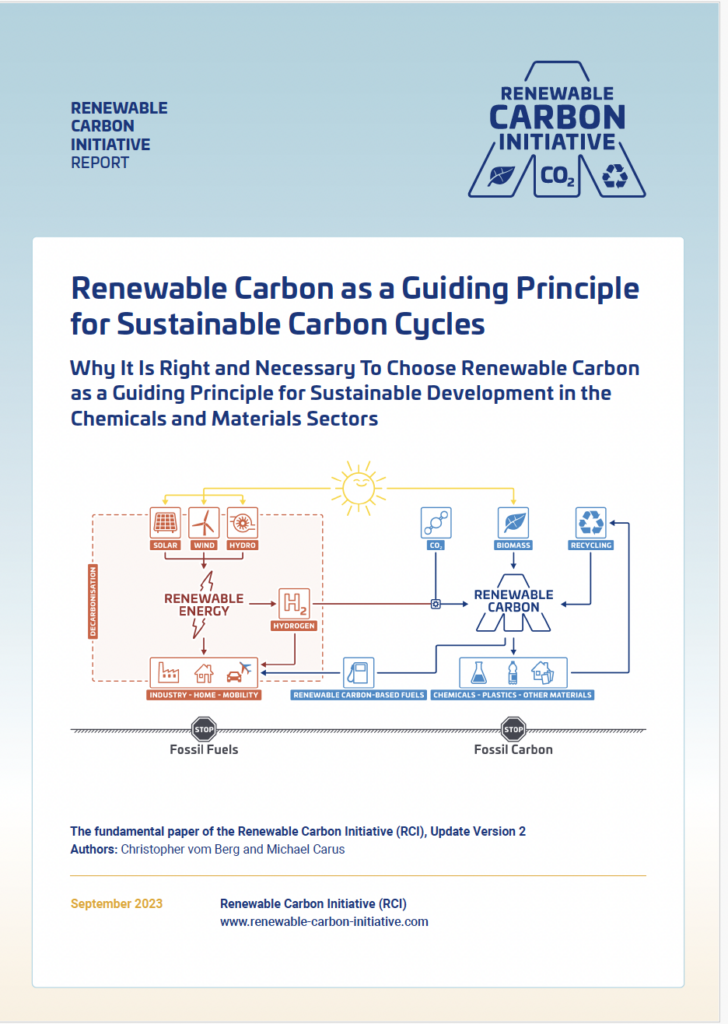
Renewable Carbon as a Guiding Principle for Sustainable Carbon Cycles
September 2023
This report was RCI’s first major publication and forms the basis for the concept and strategy of the RCI. Together with input from all members, the RCI has worked on an updated version (https://doi.org/10.52548/CXFS7519).
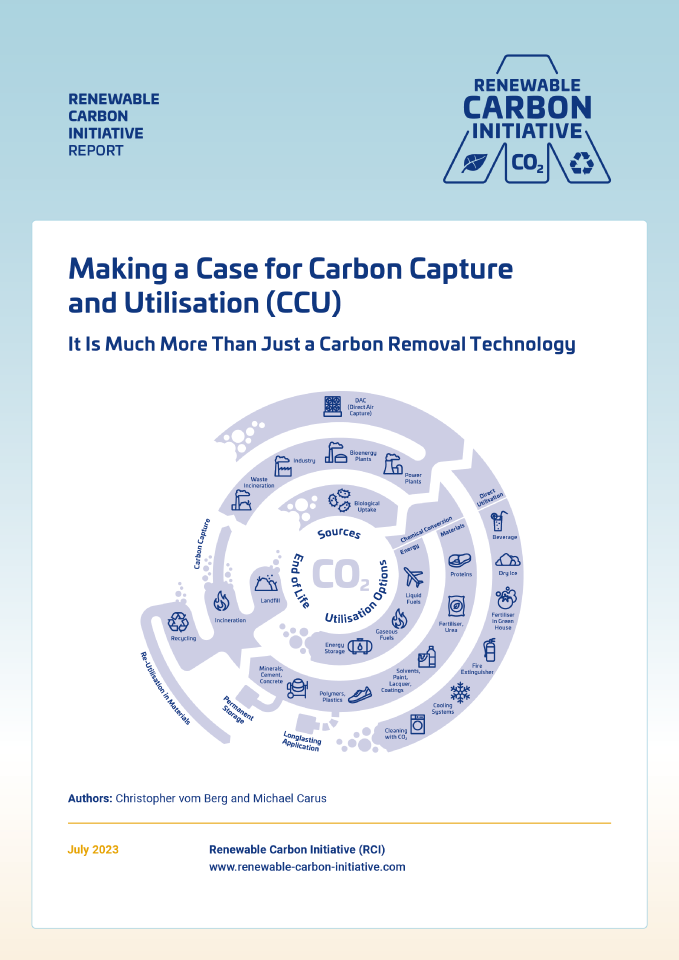
Making a Case for Carbon Capture and Utilisation (CCU) – It is Much More Than Just a Carbon Removal Technology
July 2023
The paper highlights the importance of Carbon Capture and Utilisation (CCU) and the need for more political recognition and support for CCU. CCU is a central pillar for the biggest transformation of the chemical and material industry since the industrial revolution. But it needs political support that goes beyond carbon removal only (https://doi.org/10.52548/VYKR3129).
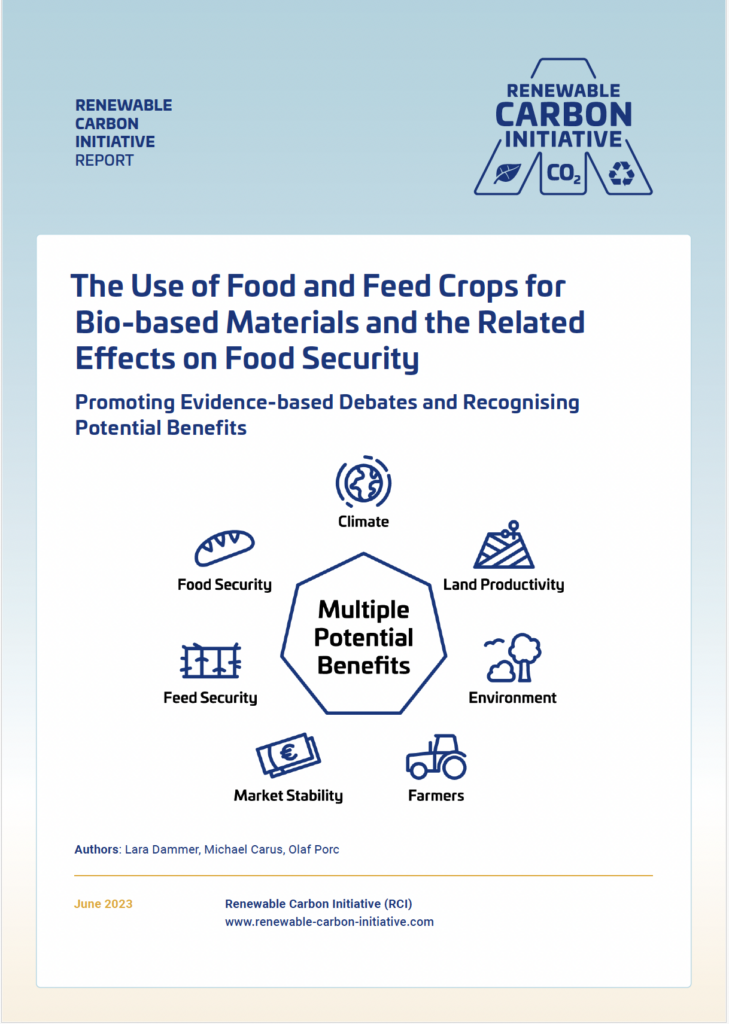
The Use of Food and Feed Crops for Bio-based Materials and the Related Effects on Food Security – Promoting Evidence-based Debates and Recognising Potential Benefits
LONG VERSION
June 2023
The paper aims to show that the well-known debate on biomass utilisation for bio-based materials is flawed, subjective and not fully based on evidence. The authors of the paper argue that using food and feed crops for chemicals and materials will not necessarily exacerbate food insecurity, and in fact has the potential to cause multiple benefits for local and global food security, climate mitigation and other factors (https://doi.org/10.52548/WQXU7327).
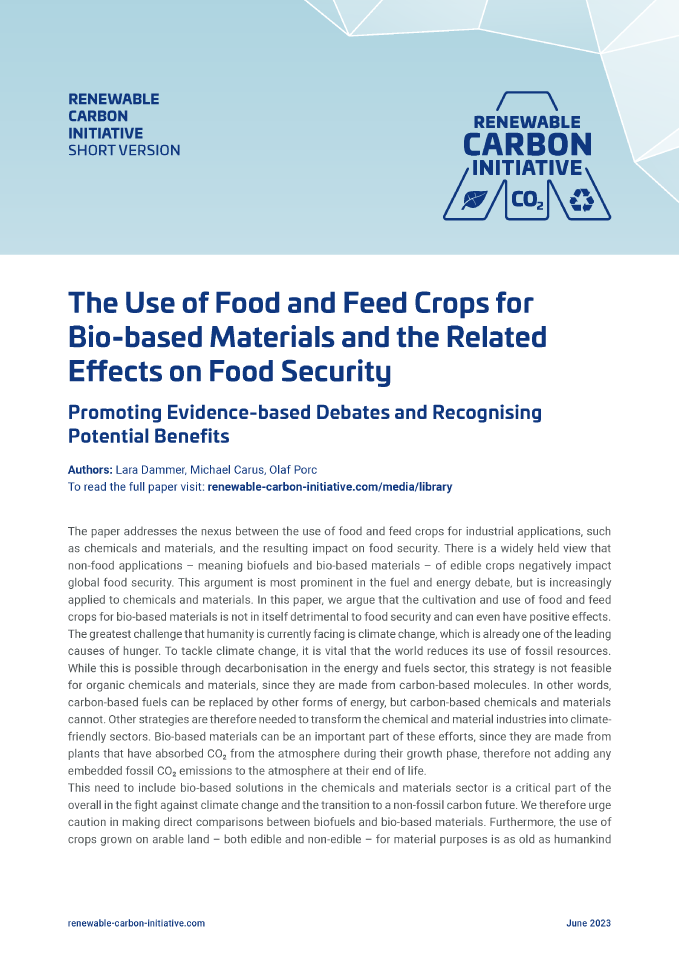
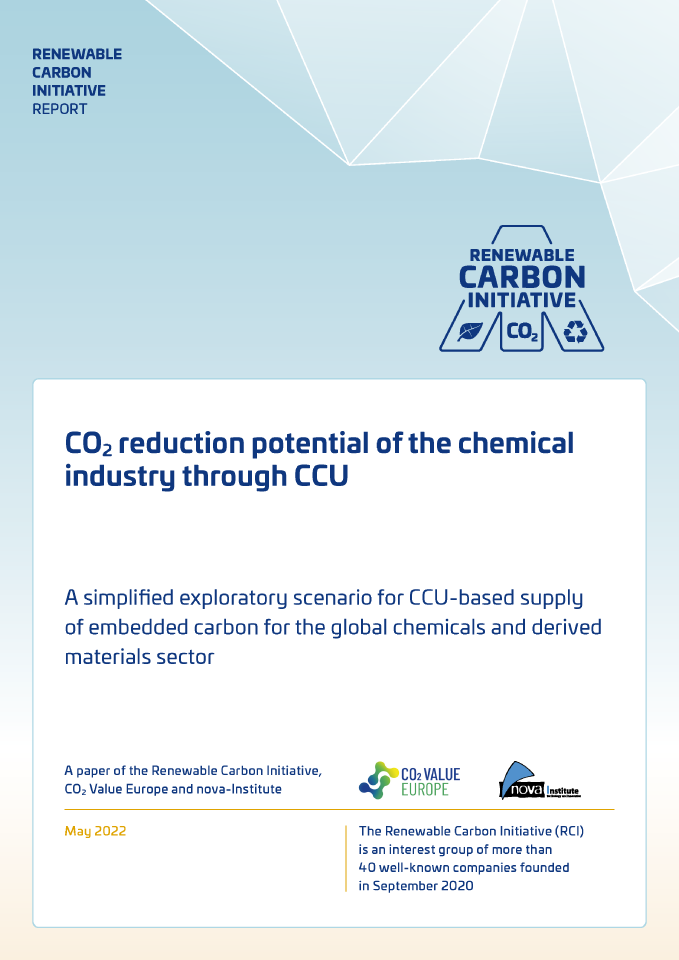
CO2 Reduction potential of the chemical industry through CCU
May 2022
In an exploratory scenario, this study investigates the CO₂ emission reductions that can be achieved in the global chemical and derived material industries if, as a plausible scenario, the entire demand for embedded carbon is met solely and exclusively via CO₂-based methanol instead of methanol from fossil sources (https://doi.org/10.52548/UTRL5869).
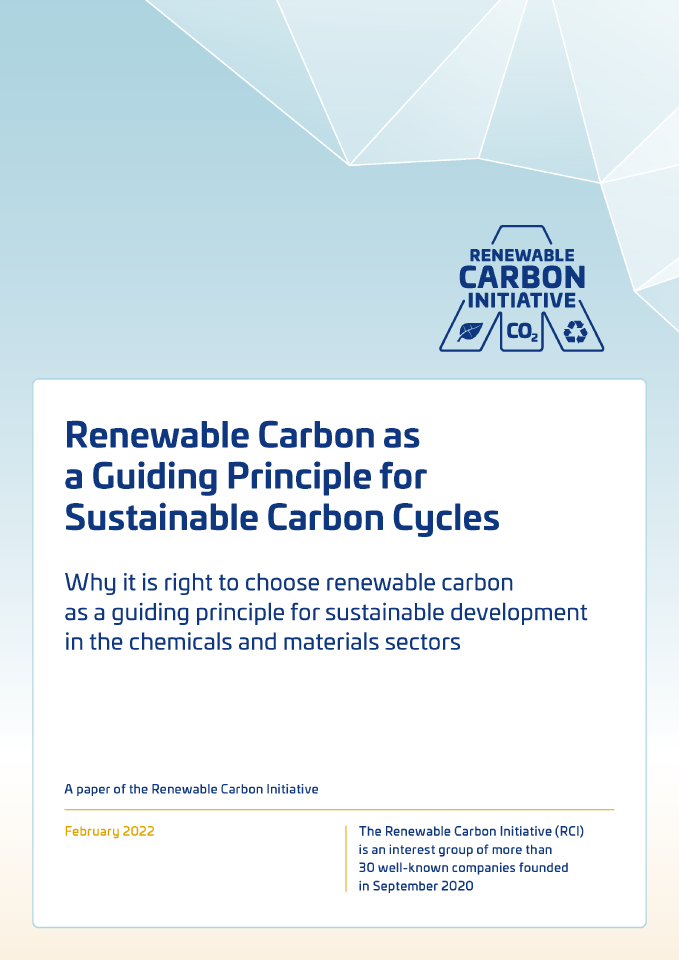
Renewable Carbon as a guiding principle for sustainable carbon cycles
February 2022
This is the core background paper of RCI and explains in detail why it is right to choose renewable carbon as a guiding principle for sustainable development in the chemicals and materials sectors (https://doi.org/10.52548/QUHG1295).
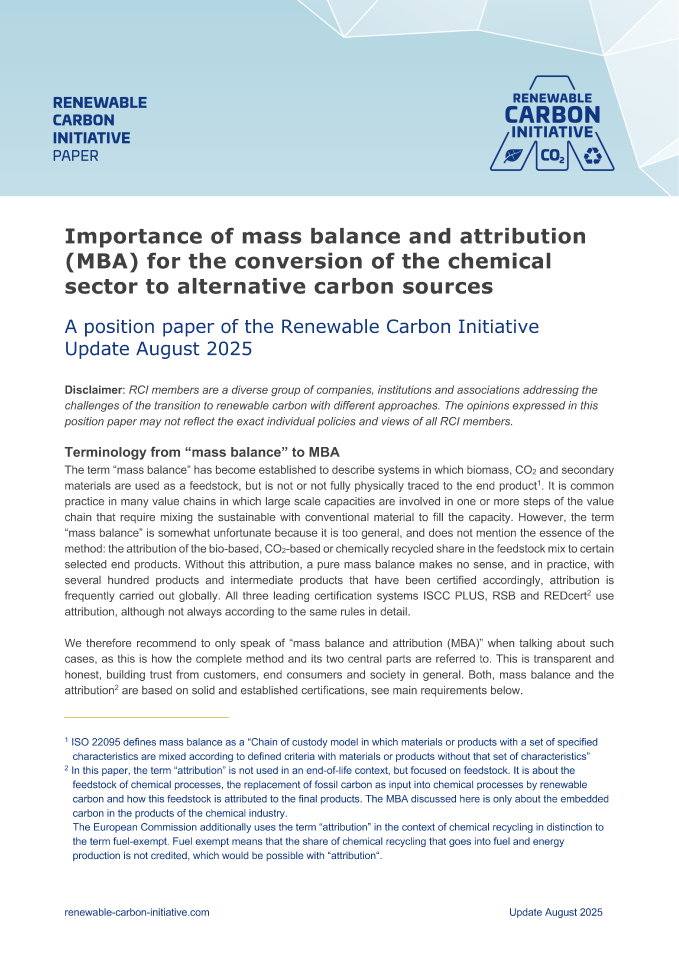
Mass Balance and Attribution (MBA): Update 2025
August 2025
This position paper highlights the importance of mass balance and attribution “MBA” as one possible way to incentivise the transformation of the chemical sector away from fossil to renewable carbon. This 2025 update now includes a brief overview and figure of MBA as defined at EU level, via the SUPD Implementing Decision on the recycling of a single-use plastics bottle. This establishes overall regulatory support for MBA in the EU as well as an applicable methodological framework for MBA in practice.
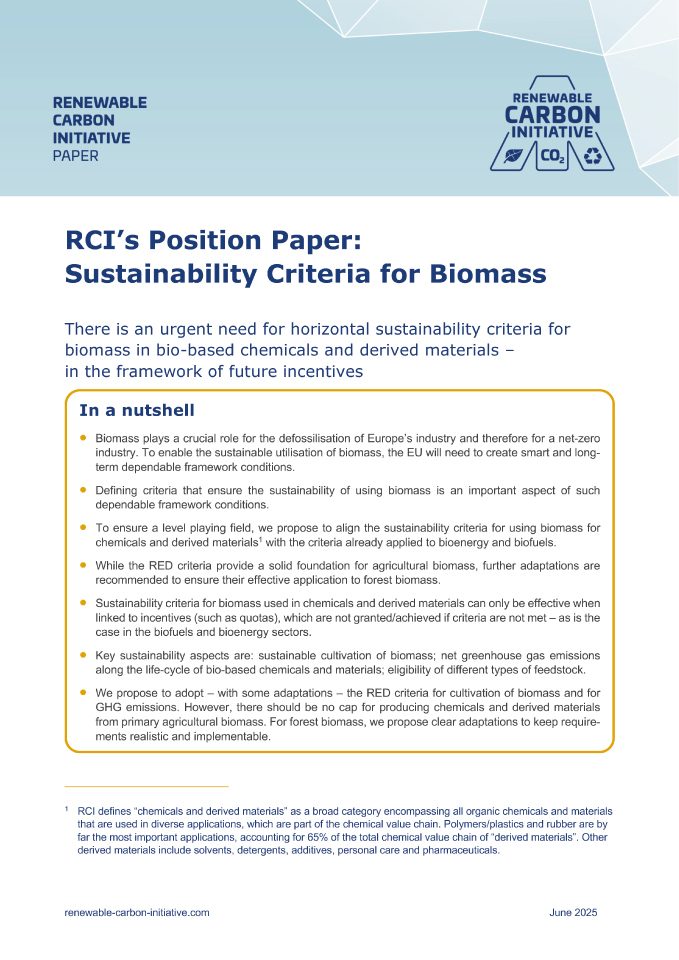
Sustainability Criteria for Biomass: There Is an Urgent Need for Horizontal Sustainability Criteria for Biomass in Bio-Based Chemicals and Derived Materials in the Framework of Future Incentives
June 2025
This position paper on sustainability criteria for biomass emphasises that biomass is essential for Europe’s net-zero transition by replacing fossil resources in chemicals and materials. The EU must establish clear, aligned sustainability criteria for biomass use in chemicals, based on the Renewable Energy Directive (REDIII) but adapted for this sector. These criteria should address sustainable cultivation of feedstock, full life-cycle greenhouse gas emissions, and feedstock eligibility, and be linked to market incentives to ensure effectiveness.
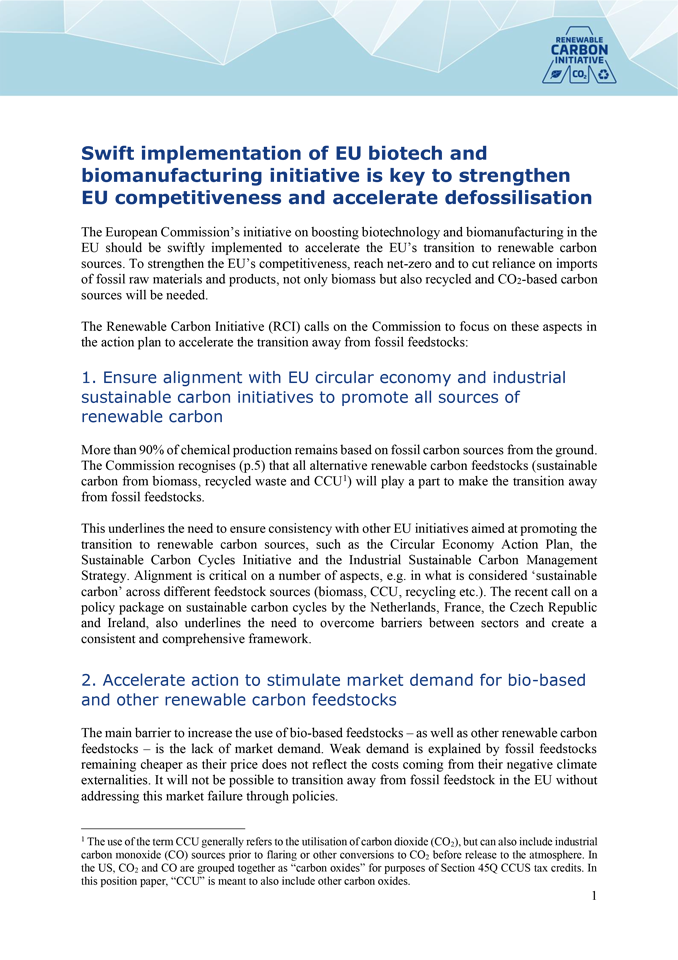
Swift implementation of EU Biotech and Biomanufacturing Initiative Is Key to Strengthen EU Competitiveness and Accelerate Defossilisation
September 2024
This position paper emphasises that the EU must swiftly implement its biotechnology and biomanufacturing initiative to accelerate the shift from fossil carbon to renewable sources and boost competitiveness
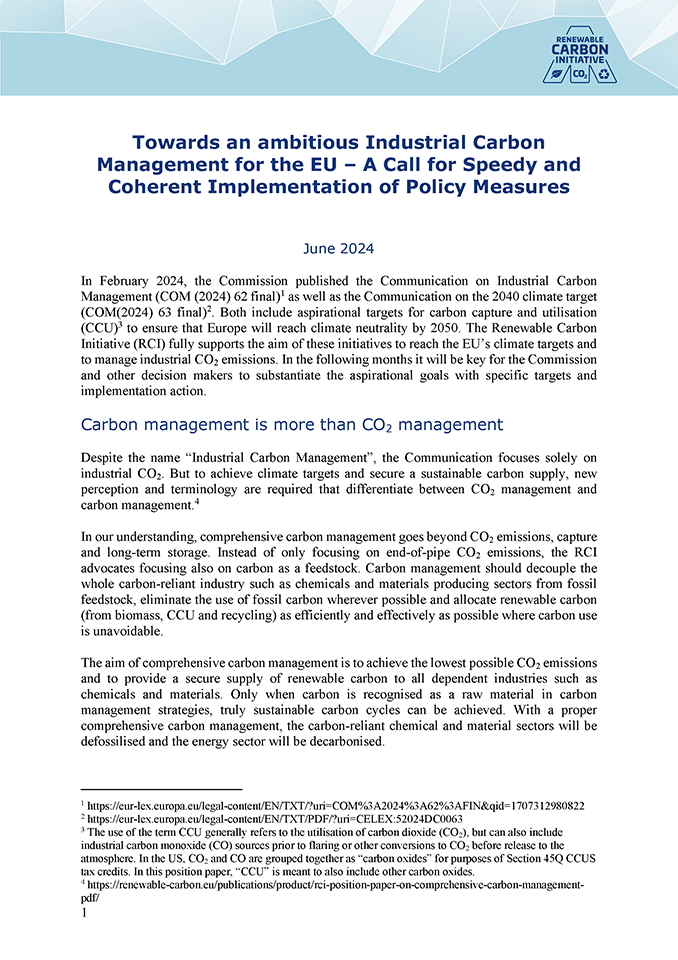
Towards an Ambitious Industrial Carbon Management for the EU: A Call for Speedy and Coherent Implementation of Policy Measures
June 2024
This position paper emphasizes the need for a comprehensive industrial carbon management strategy in the EU that goes beyond CO2 emissions to include all carbon sources, promoting the use of renewable carbon from biomass, CCU, and recycling. It calls for the establishment of a regulatory framework with specific sub-targets and incentives by 2025 to accelerate the adoption of circular carbon technologies and reduce dependence on fossil feedstocks. The paper argues that recognising carbon as a raw material is essential for achieving sustainable carbon cycles and meeting the EU’s climate neutrality goals by 2050.
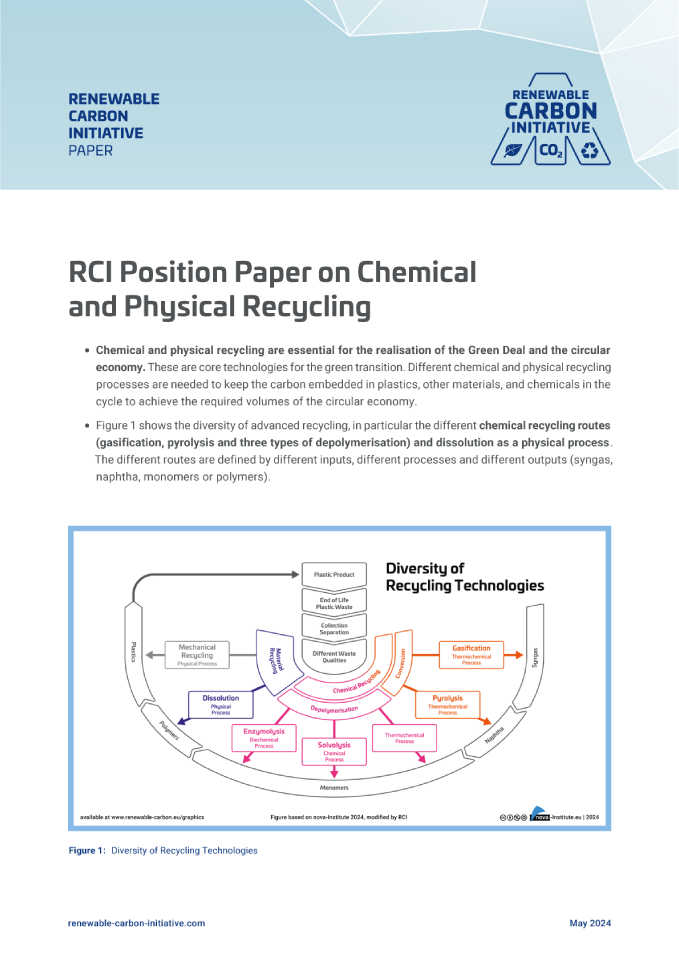
Chemical and Physical Recycling
May 2024
This position paper describes that chemical and physical recycling play essential roles in realising the objectives of the Green Deal and advancing the circular economy. These technologies are indispensable for the green transition.
This position paper identifies eleven requirements to create secure demand, drive investment and further improve the technology field.
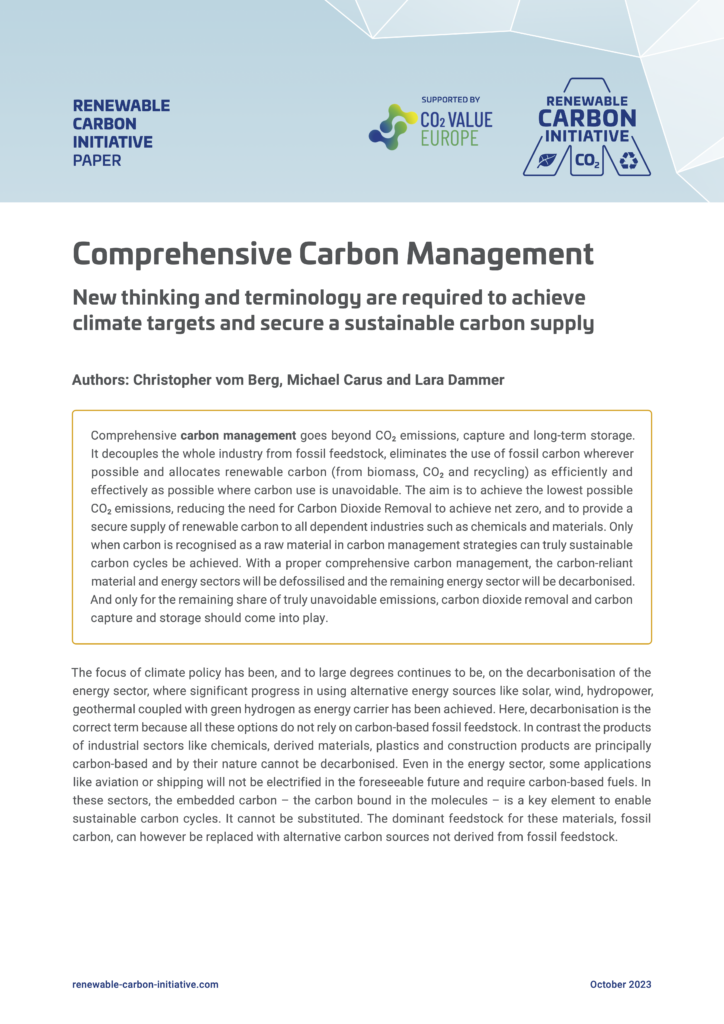
Comprehensive Carbon Management
October 2023
This RCI position paper calls for new thinking and terminology when it comes to carbon management in order to achieve climate targets and secure a sustainable carbon supply.
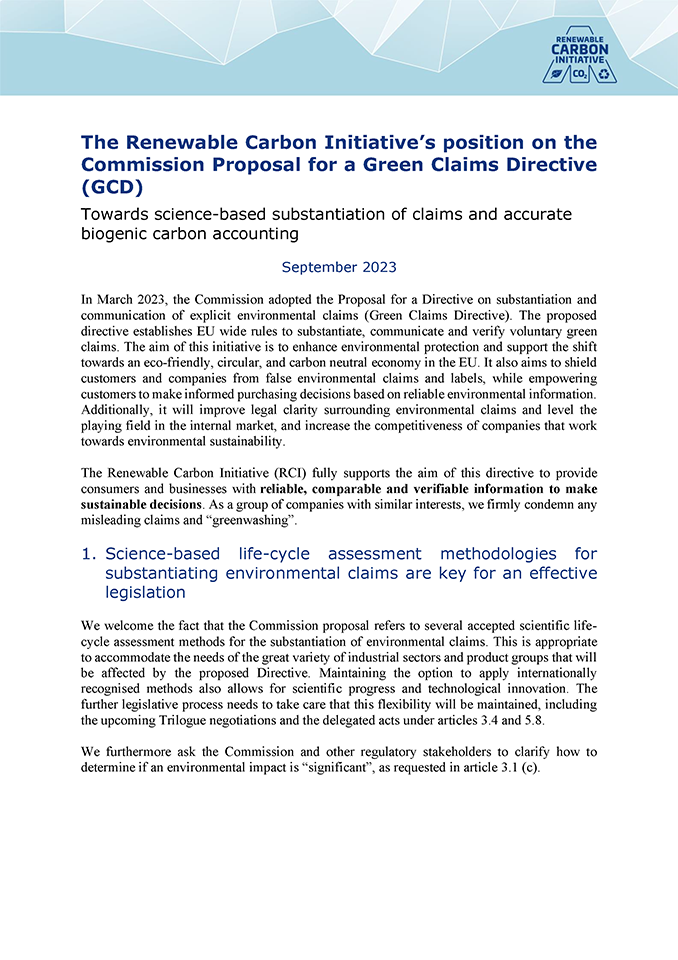
Commission Proposal for a Green Claims Directive (GCD): Towards Science-Based Substantiation of claims and Accurate Biogenic Carbon Accounting
September 2023
The RCI endorses the Green Claims Directive’s (GCD) mission to provide consumers and businesses with reliable, comparable, and verifiable information to facilitate sustainable choices. In our position paper, we emphasise three aspects that, in our view, require additional attention to maximise the impact of the GCD and support products and solutions derived from non-fossil, renewable-carbon-based feedstock from biomass, CCU or recycling.
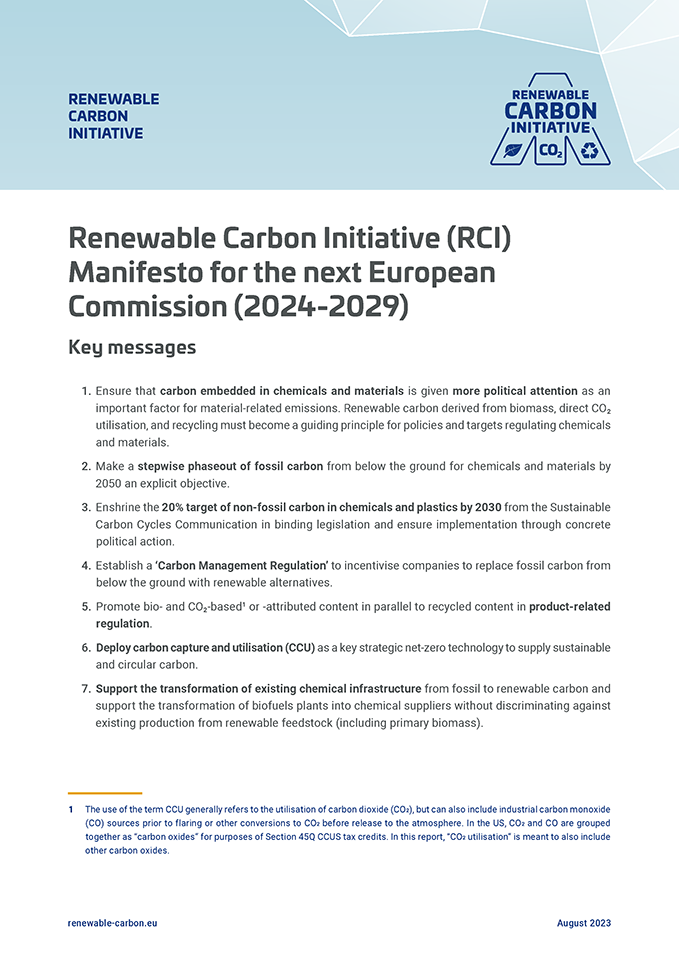
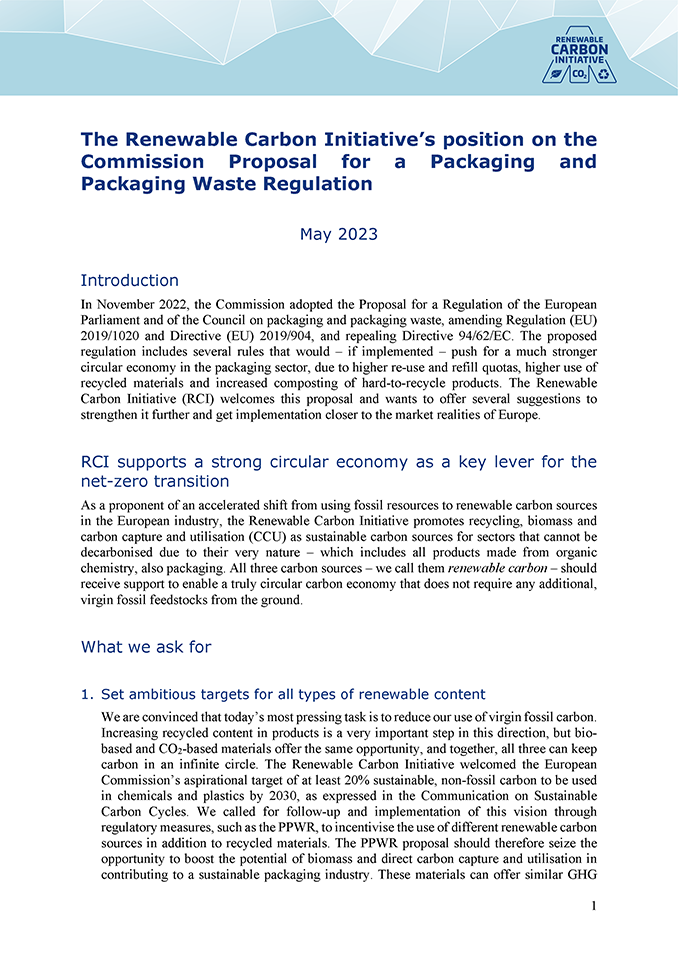
Commission Proposal for a Packaging and Packaging Waste Regulation
May 2023
This position paper highlights chances for the EU to lead the way to a sustainable packaging industry and to promote innovation.
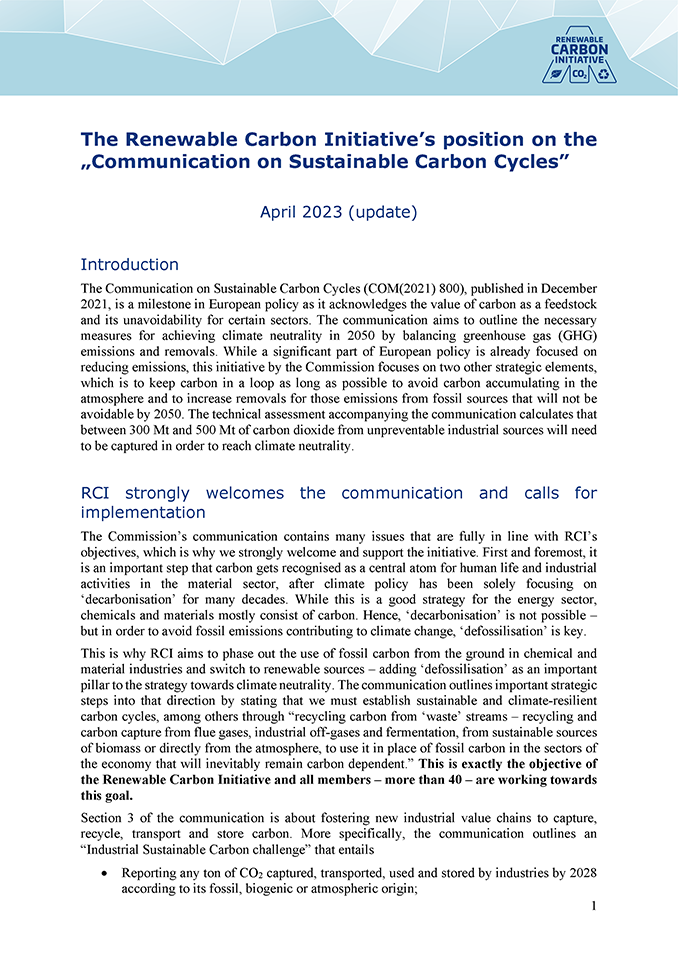
Communication on Sustainable Carbon Cycles
April 2023
The Communication on Sustainable Carbon Cycles (December 2021) is a milestone in European policy as it acknowledges the value of carbon as a feedstock and its need in certain sectors. This position paper highlights why this is an important step in the right direction and asks policy makers for effective follow-up.
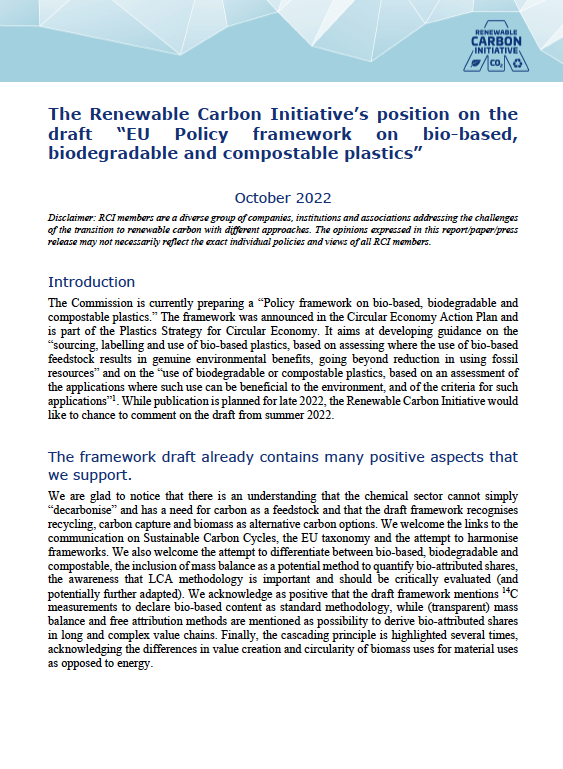
Draft EU Policy Framework on Bio-Based, Biodegradable and Compostable Plastics
October 2022
The Commission “Policy framework on bio-based, biodegradable and compostable plastics” aims at developing guidance on the sustainable use of bio-based plastics and on the use of biodegradable or compostable plastics. This position paper of the RCI comments on the draft from summer 2022.
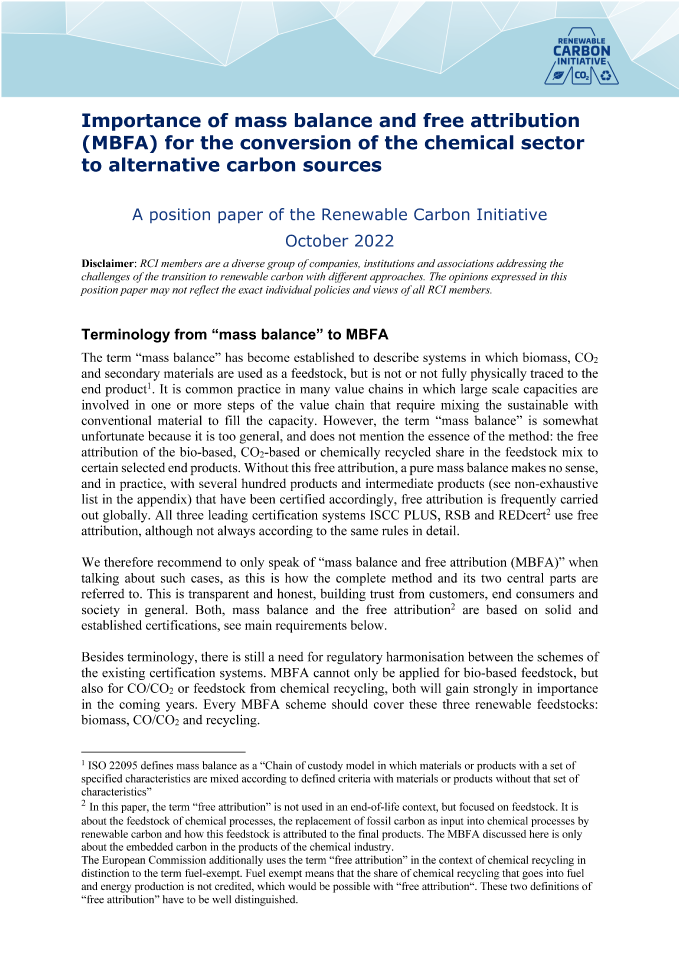
Mass Balance and Free Attribution
October 2022
This position paper highlights the importance of mass balance and free attribution “MBFA” as one possible way to incentivise the transformation of the chemical sector away from fossil and on towards renewable carbon.
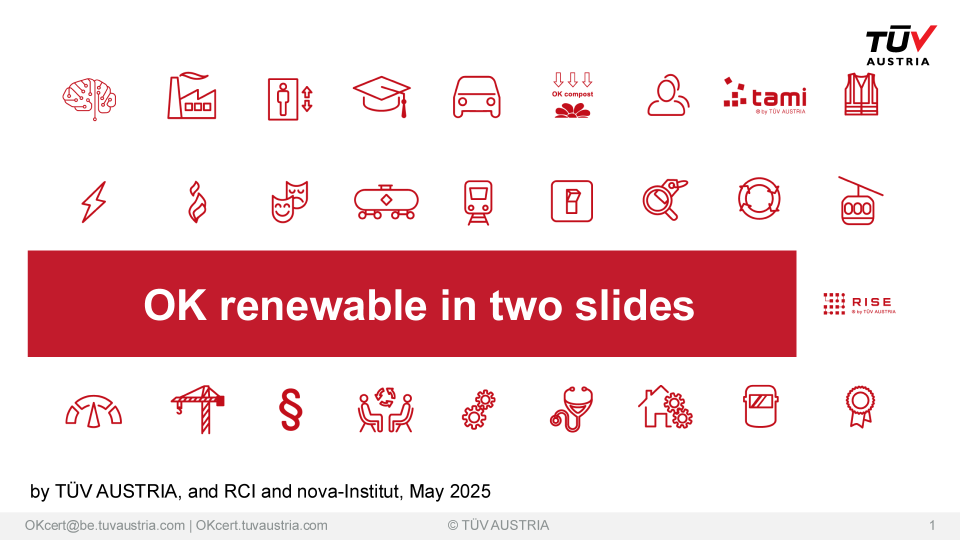
OK renewable Label
April 2025
This short document explains the OK renewable label, developed by RCI, nova and TÜV Austria and launched on 1 April 2025. The OK renewable label provides a clear, trustworthy way to identify products whose carbon content is derived from non‑fossil sources. Products earn an RCS classification based either on their actual renewable carbon content or through documented substitution of fossil‑based feedstock with renewable alternatives.
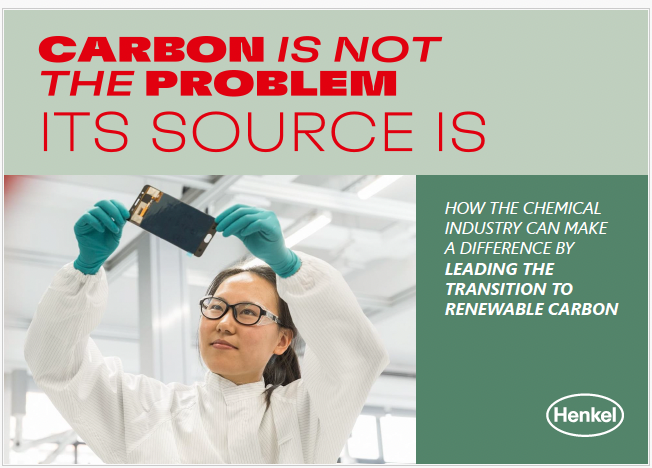
Henkel’s Whitepaper “Carbon is not the problem – its source is”
2024
Henkel’s Whitepaper on Renewable Carbon (2024) outlines the urgent need for the chemical industry to move away from fossil-based carbon and transition to renewable carbon sources such as biomass, captured CO₂, and recycled materials. It argues that decarbonising energy alone is not enough—carbon embedded in products must also be addressed. Henkel highlights its own role in driving this shift through innovation, partnerships, and product development, calling for industry-wide collaboration, clear policy frameworks, and consistent carbon accounting to scale renewable carbon solutions and support a circular, defossilised economy.
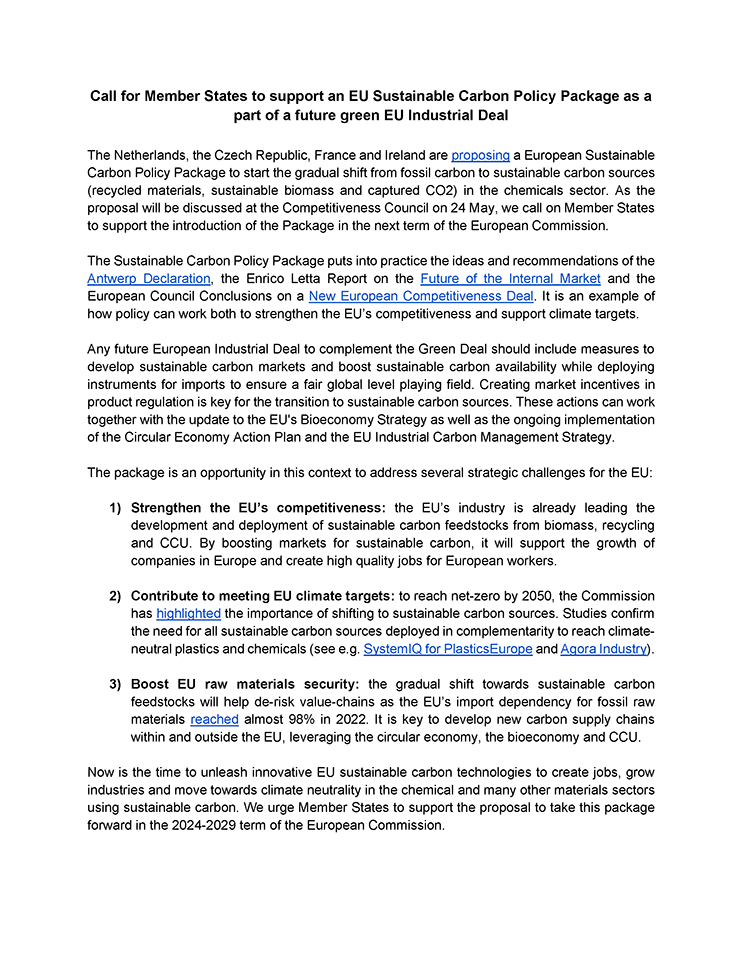
Call for Member States to support an EU Sustainable Carbon Policy Package as a part of a future green EU Industrial Deal
May 2024
The signatories of this proposal (Renewable Carbon Initiative, Bio-based Industries Consortium, BioChem Europe, CO2 Value Europe European Bioplastics, Polyolefin Circular Economy Platform Plastics Europe) urge Member States to support the EU Sustainable Carbon Policy Package for the 2024-2029 term of the European Commission.
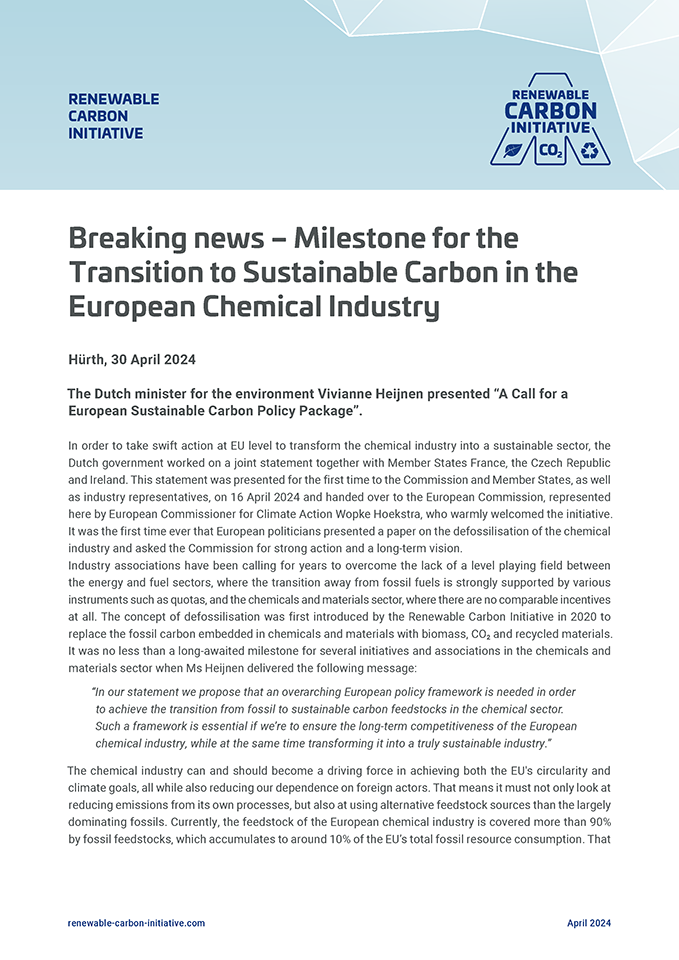
Breaking news – Milestone for the Transition to Sustainable Carbon in the European Chemical Industry
May 2024
A group of four EU member states – the Netherlands, France, Ireland and the Czech Republic – are proposing an overarching long-term European policy framework to the European Commissioner for Climate Action, Wopke Hoekstra, who has warmly welcomed the initiative. The joint statement aims to achieve a transition from fossil to sustainable carbon feedstocks in the chemical industry.
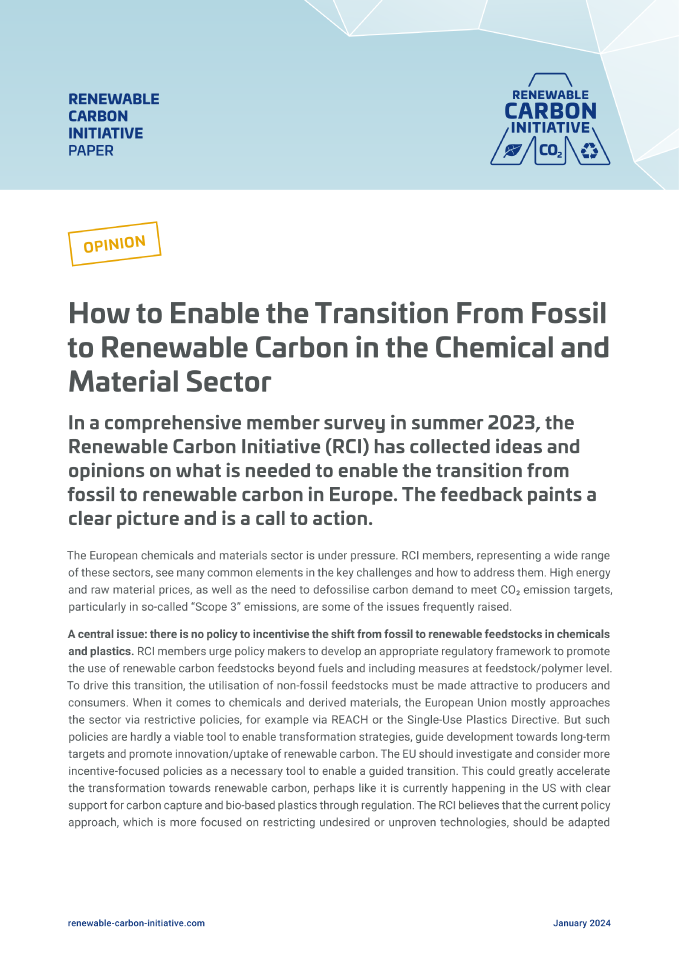
RCI Internal Survey
January 2024
In a comprehensive member survey in summer 2023, the RCI has collected ideas and opinions on what is needed to enable the transition from fossil to renewable carbon in Europe. The feedback paints a clear picture and is a call to action.
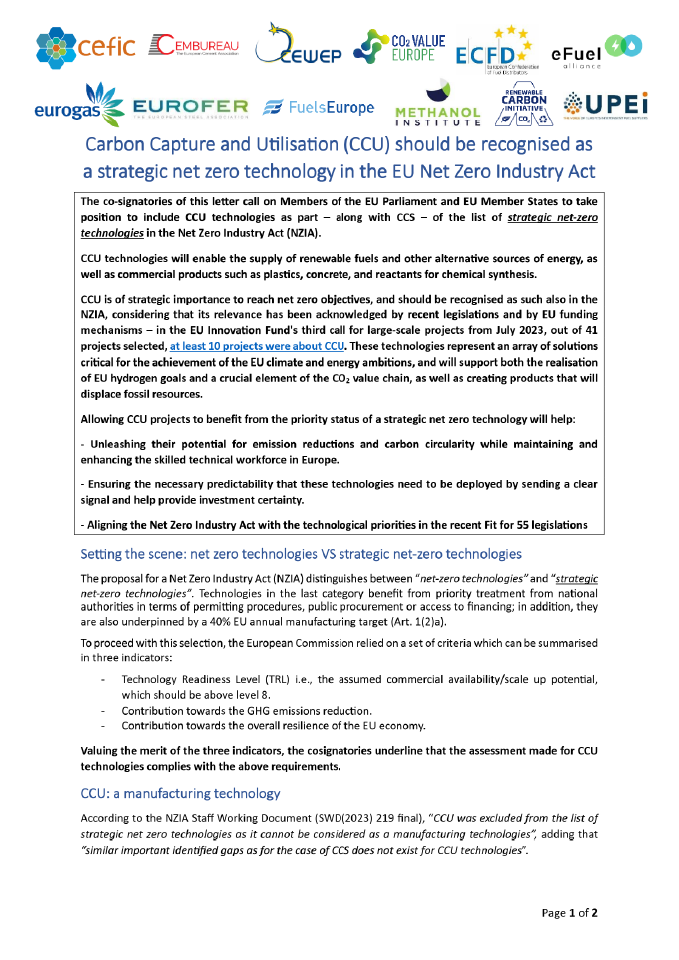
Joint Letter: Carbon Capture and Utilisation (CCU) should be recognised as a strategic net zero technology in the EU Net Zero Industry Act
October 2023
A co-signed letter with CO2 Value Europe, Cefic – European Chemical Industry Council, the European Cement Association (CEMBUREAU), The Confederation of European Waste-to-Energy Plants (CEWEP), UPEI – the Voice of Europe’s Independent Fuel Suppliers, eFuel Alliance, Eurogas, The European Steel Association (EUROFER), FuelsEurope, Methanol Institute and the European Confederation of Fuel Distributors (ECFD) that calls on Members of the EU Parliament and EU Member States to take position to include CCU technologies as part – along with CCS – of the list of strategic net-zero technologies in the Net Zero Industry Act (NZIA).
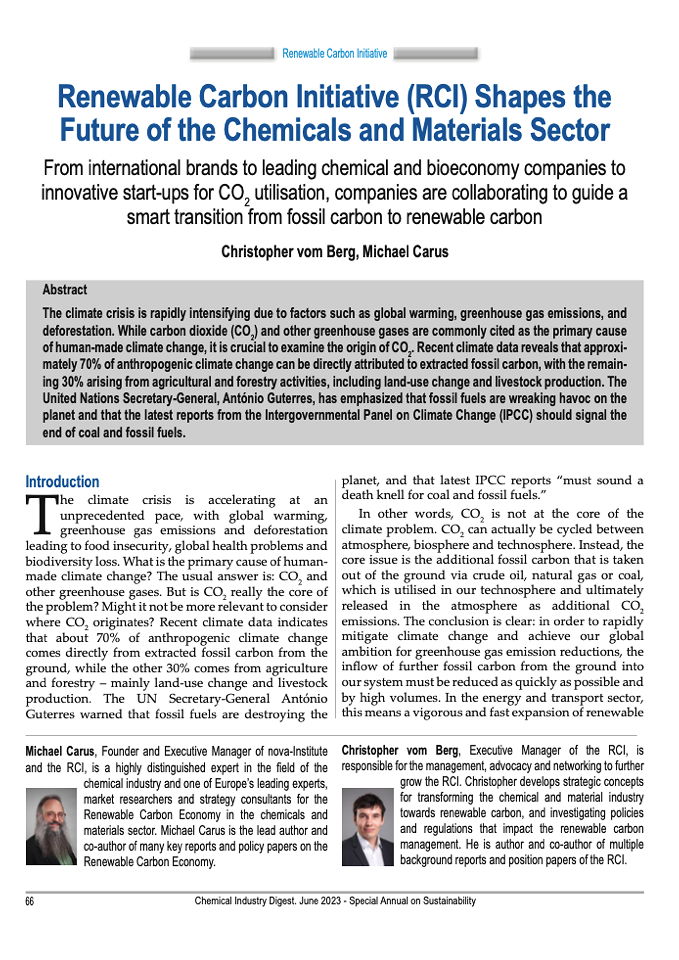
Renewable Carbon Initiative (RCI) Shapes the Future of the Chemicals and Materials Sector
June 2023
The June issue of the magazine “Chemical Industry Digest – Special Annual on Sustainability” outlines the goal, vision and achievements of the RCI.
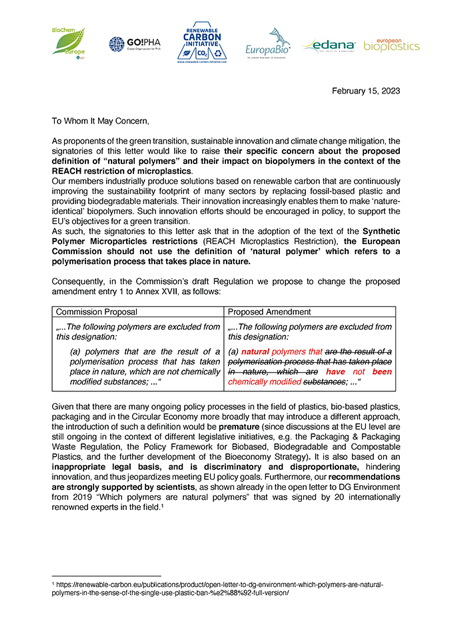
Letter to the Commission on the definition of natural polymers in the REACH microplastics restriction
February 2023
A co-signed letter with BioChem Europe (a sector group of Cefic), EDANA, EuropaBio, European BioPlastics, and GO!PHA, where specific concerns about the proposed definition of “natural polymers” in the adoption the Synthetic Polymer Microparticles restrictions (REACH Microplastics Restriction) of the European Commission as well as an alternative definition are suggested.
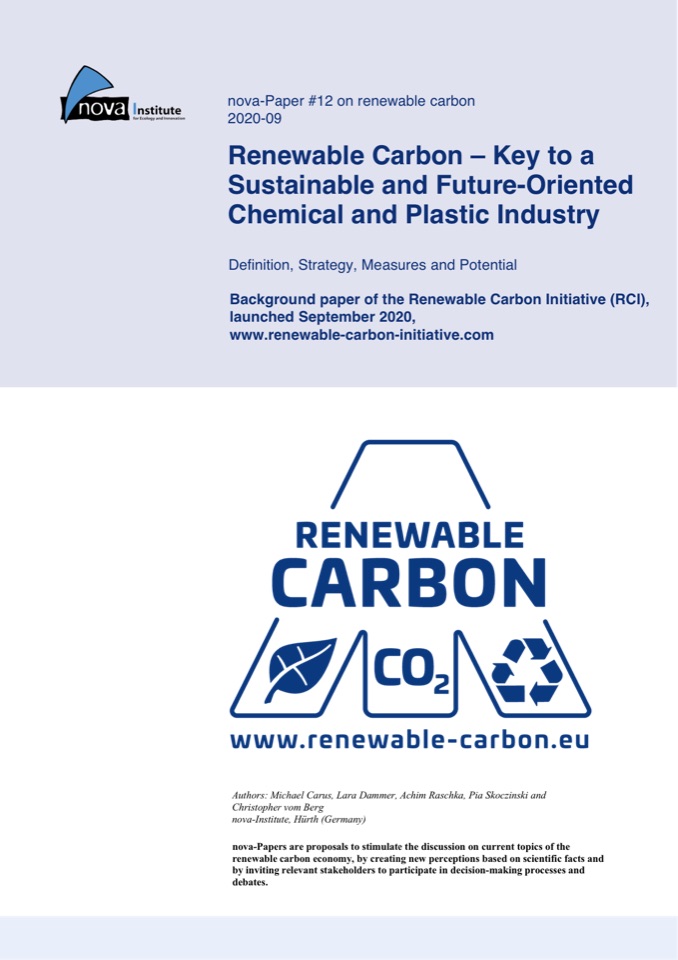
nova paper #12
September 2020
Renewable carbon – key to a sustainable and future-oriented chemical and plastic industry.
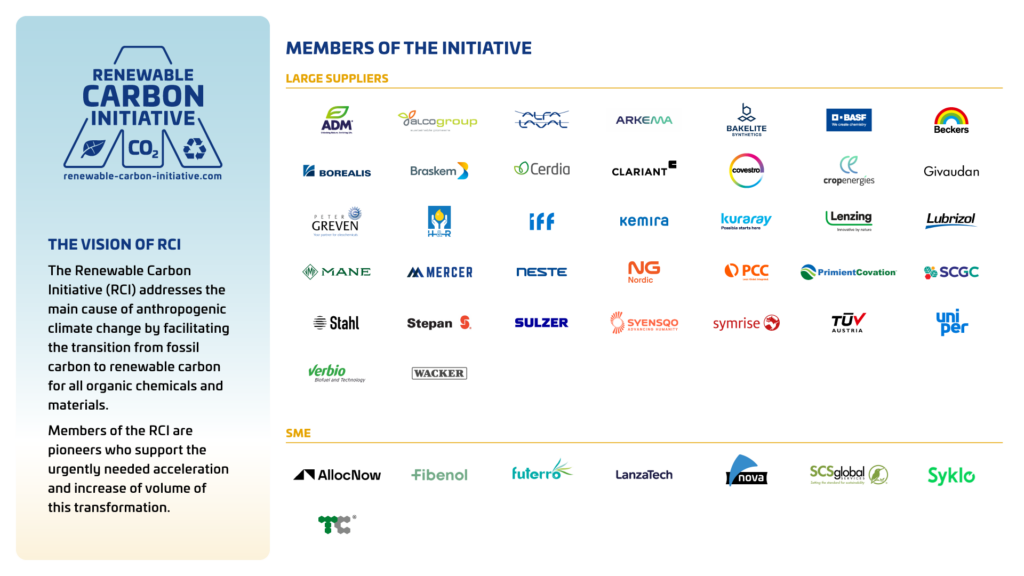
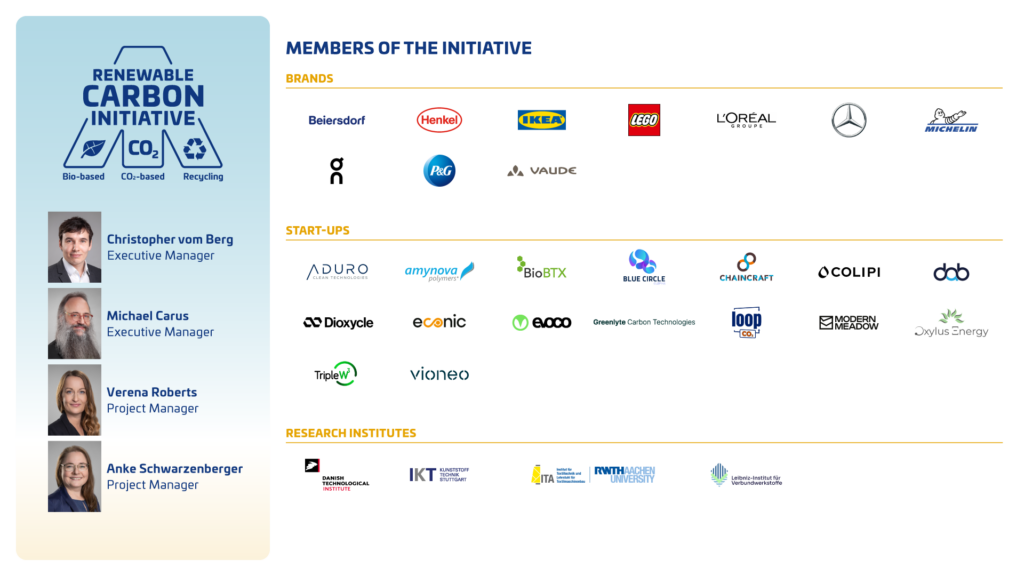
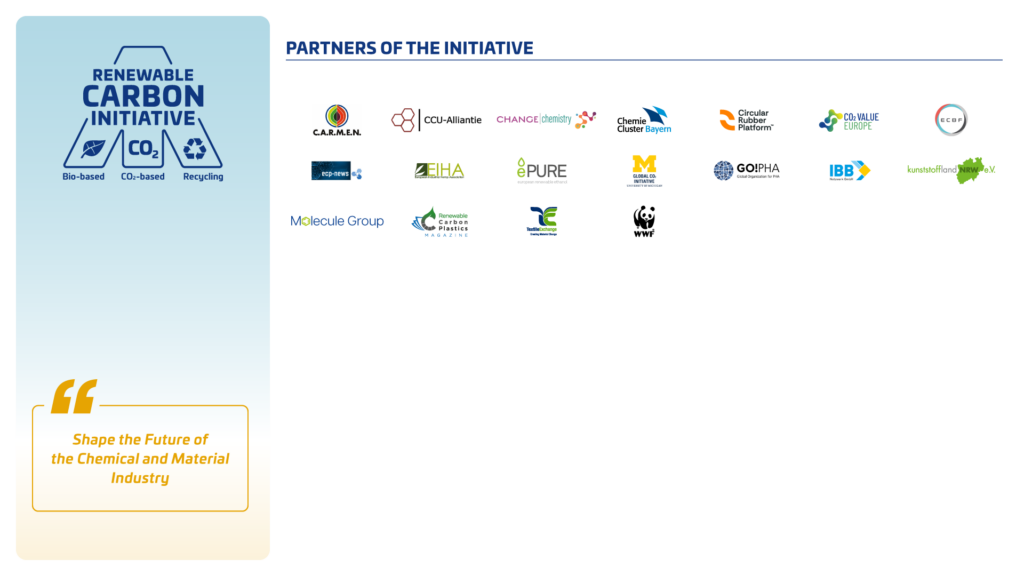
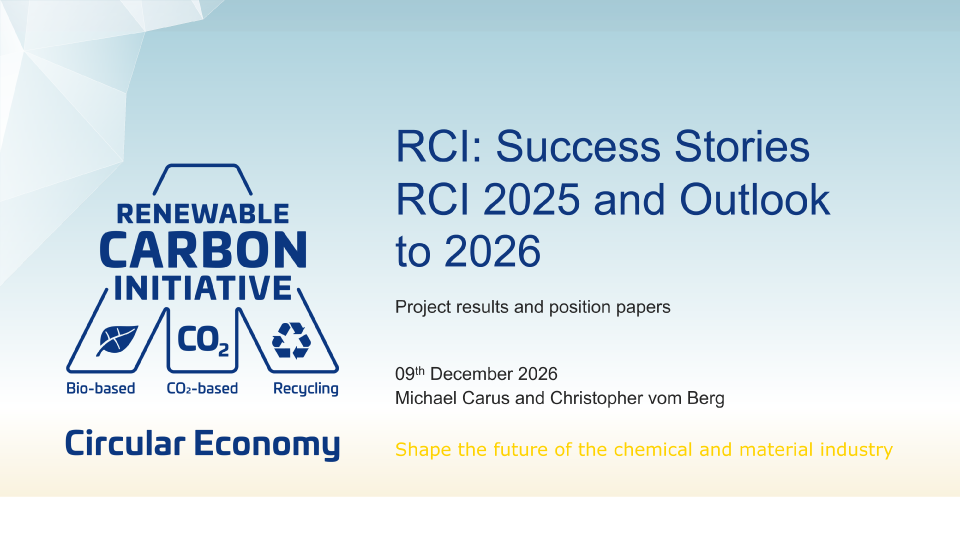
RCI Webinar: Success Stories RCI 2025 and Outlook to 2026
December 2025
The free RCI webinar on 9 December 2025 presented the RCI Success Stories 2025 and offered an Outlook to 2026. It showcased RCI’s policy impact at EU, national and international levels, highlighted key publications and scientific results (including the biomass study, Policy Proposals, LCA methodologies, sustainability criteria paper, and analysis of recent updates to methane and fossil CO2 emissions data in Life-Cycle Inventories (LCI)), and summarised member activities such as expert groups, roundtables, and survey insights. The webinar also introduced RCI’s ongoing and upcoming projects for 2026, including biodiversity, policy barriers, carbon flows, LCA case studies, and awareness-building initiatives.
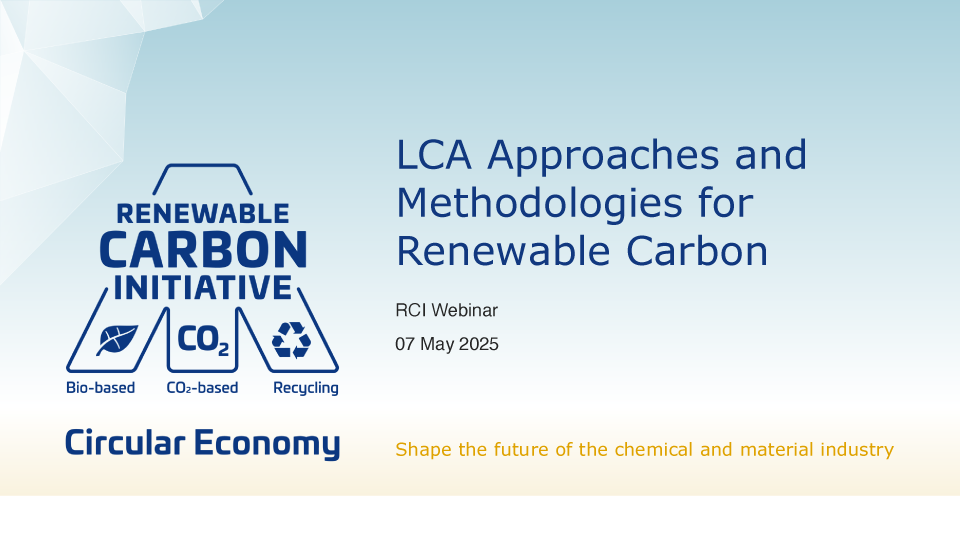
RCI Webinar: LCA Approaches and Methodologies for Renewable Carbon
May 2025
This webinar presentation is based on the key findings of the RCI Scientific Background Report “Evaluating LCA Approaches and Methodologies for Renewable Carbon Sources” and was held on 7 May 2025 by Ferdinand Kähler (nova-Institute). The session examined how major LCA and carbon footprint standards address renewable carbon sources.
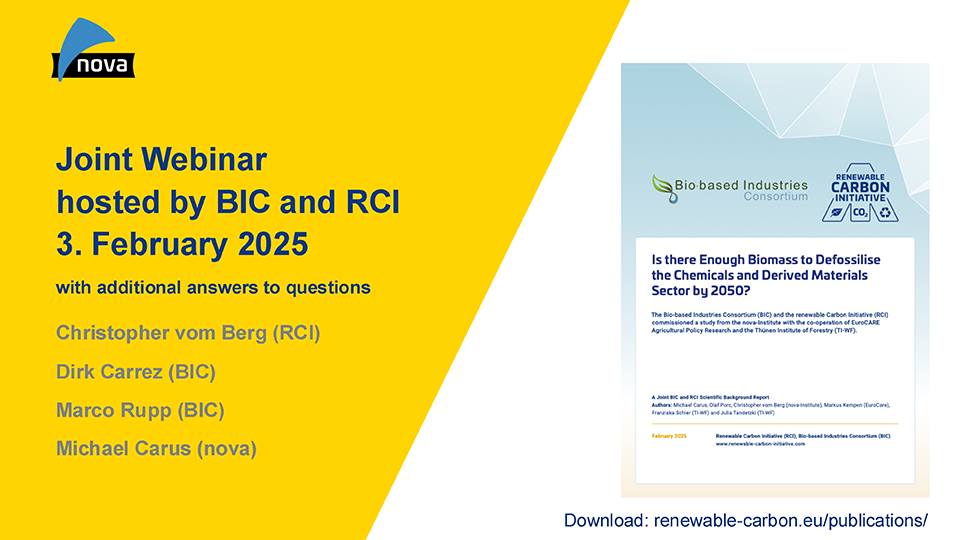
Joint Webinar hosted by Bio-based Industries Consortium (BIC) and the Renewable Carbon Initiative (RCI)
February 2025
The webinar was presented by Michael Carus (nova-Institute, RCI), supported by Christopher vom Berg (RCI), Dirk Carrez (BIC), and Marco Rupp (BIC). It was based on a Scientific Background Report “Is there enough biomass to defossilise the chemicals and derived materials sector by 2050?” commissioned by the Bio-based Industries Consortium (BIC) and the Renewable Carbon Initiative (RCI).
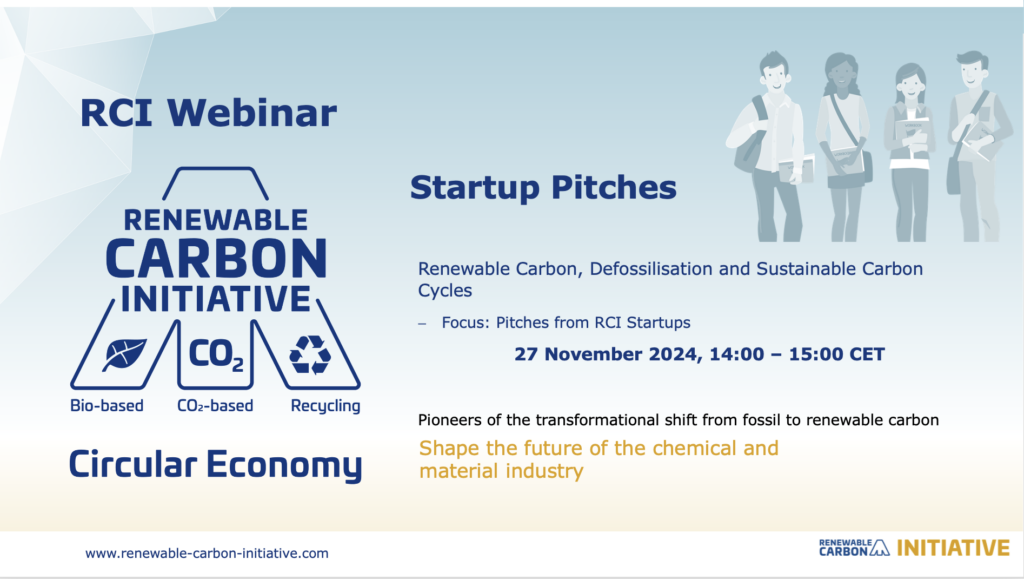
Webinar: Renewable Carbon Initiative (RCI)
November 2024
This document contains the presentations of eight RCI startups presenting their innovations in food and plastic waste recycling and Direct Air Capture (DAC).
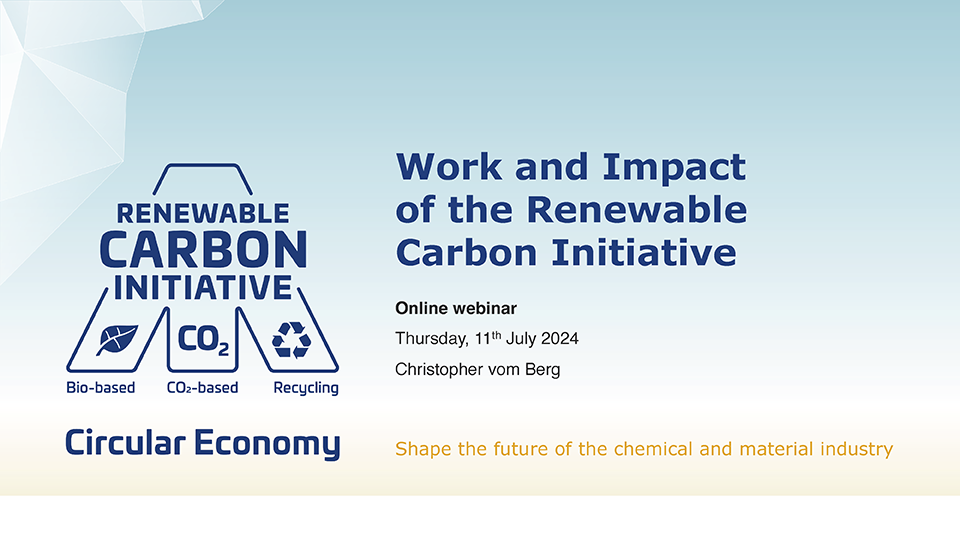
Webinar: Renewable Carbon Initiative (RCI)
July 2024
This document contains a generic set of slides to introduce the concept of renewable carbon and the Renewable Carbon Initiative. The focus of this webinar is the work and impact of the RCI. Moreover, Arndt Scheidgen, Head of Product Stewardship at Henkel Consumer Brands joined the webinar to give insights as an industry leader.
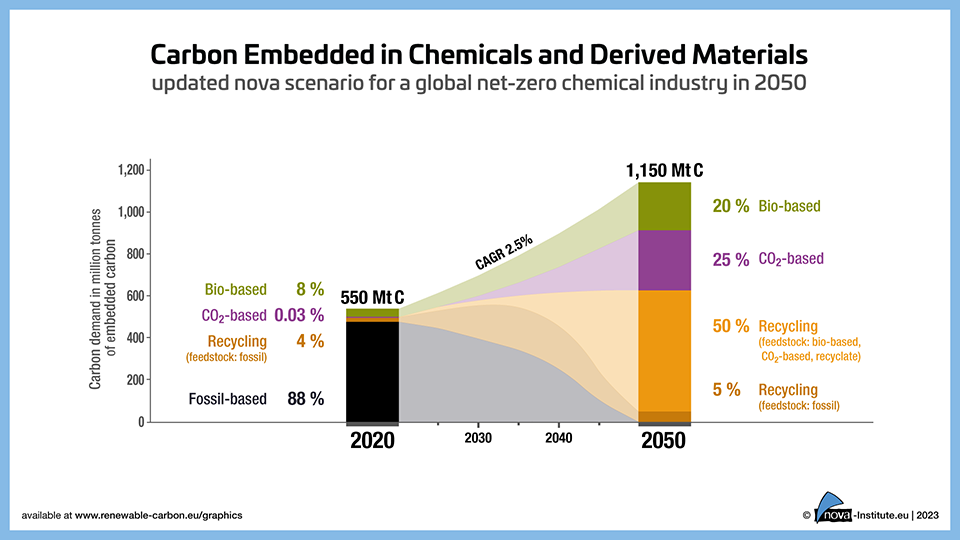
Explorative Scenario – Carbon Embedded in Chemicals and Derived Materials
October 2023
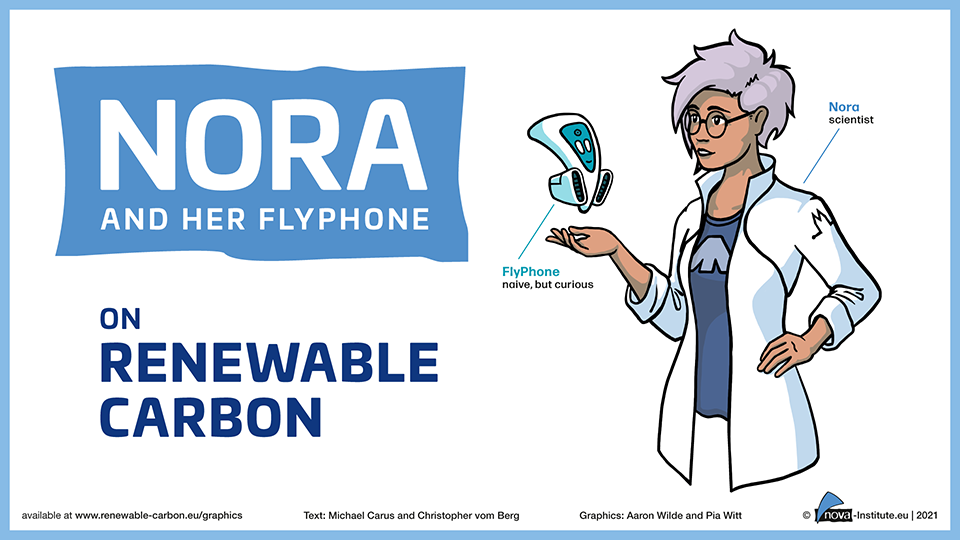
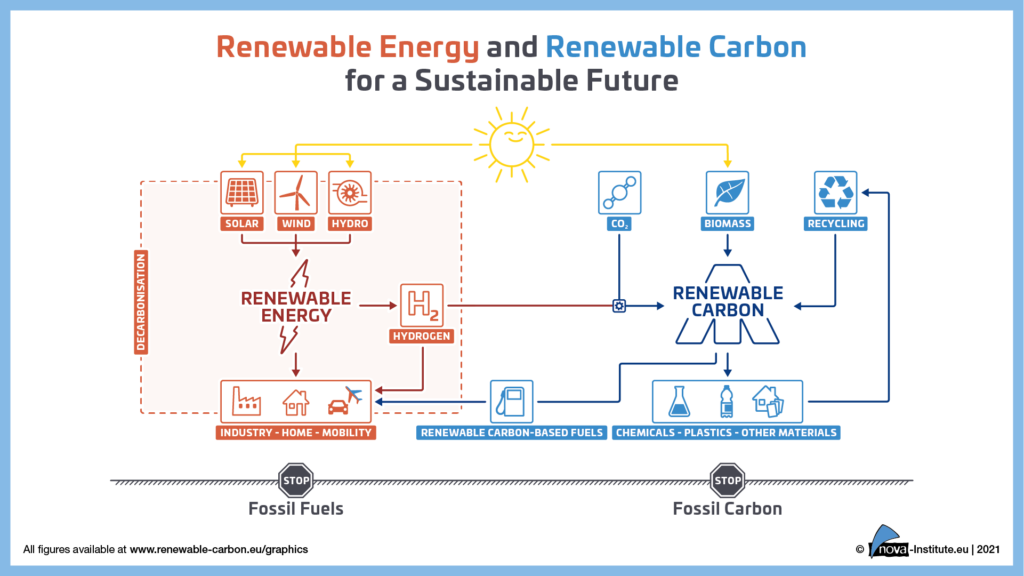
Infographic: Renewable energy and renewable carbon for a sustainable future
September 2020
